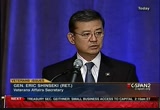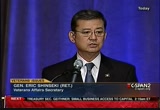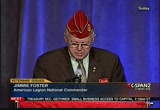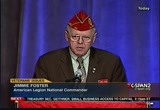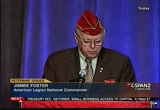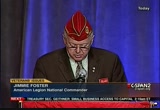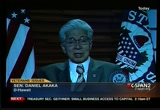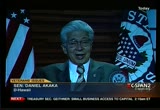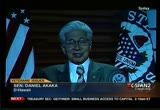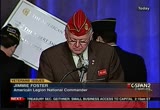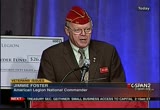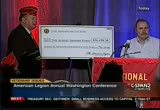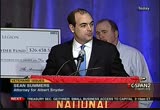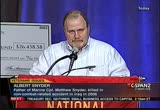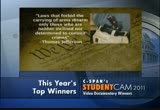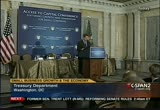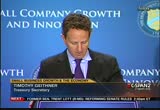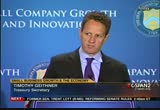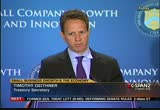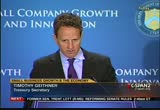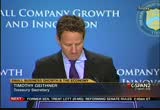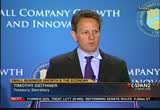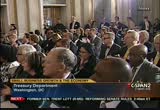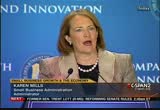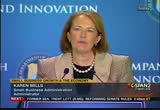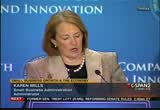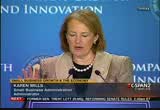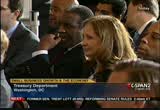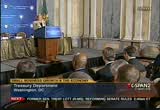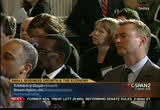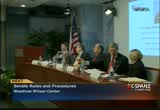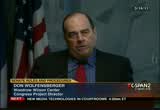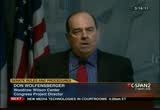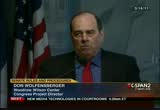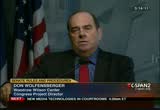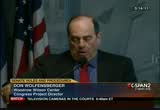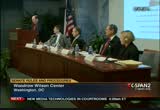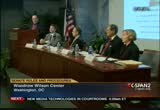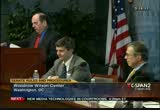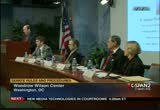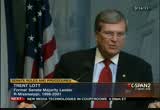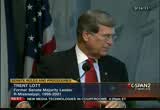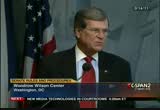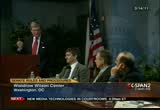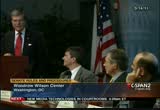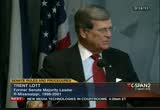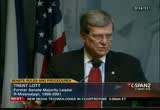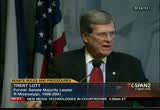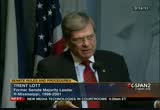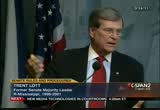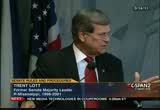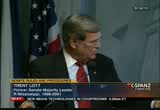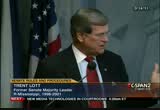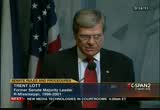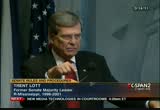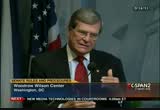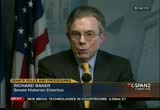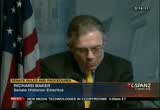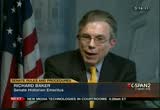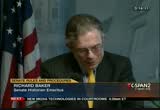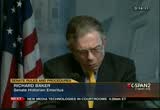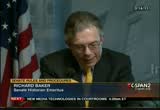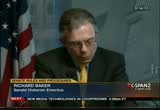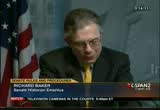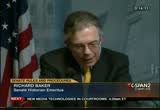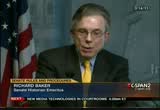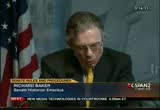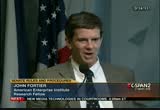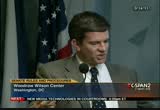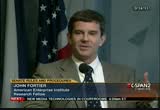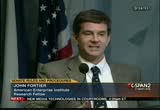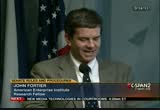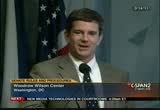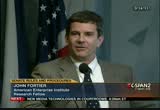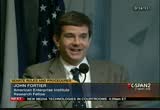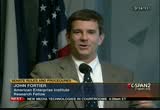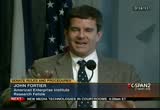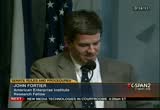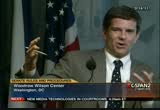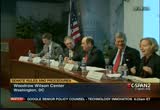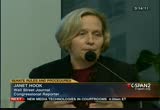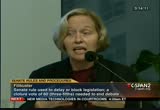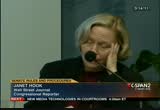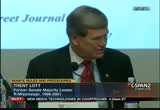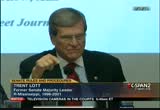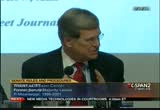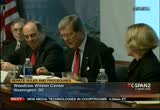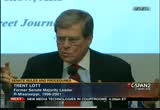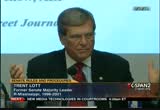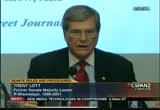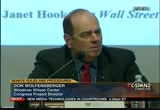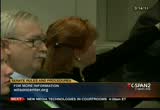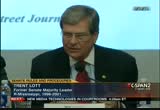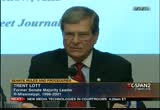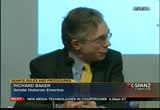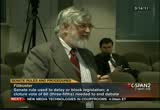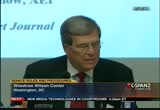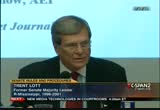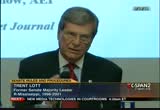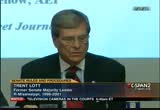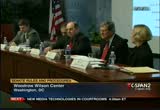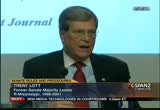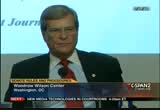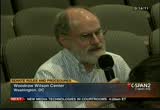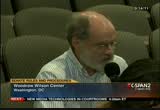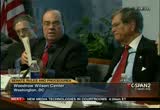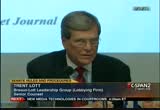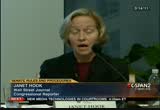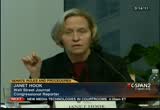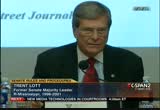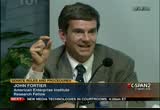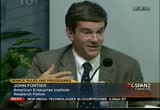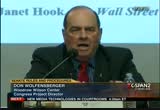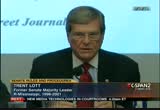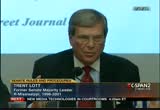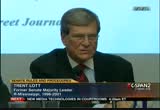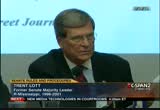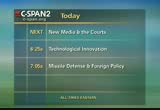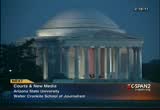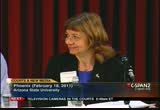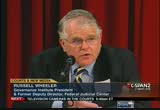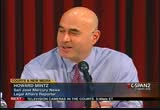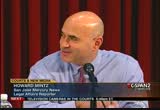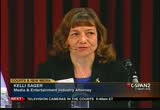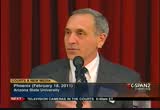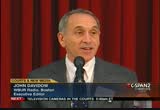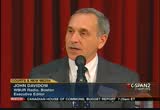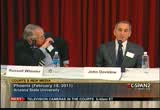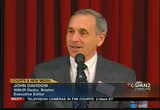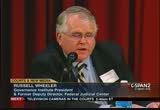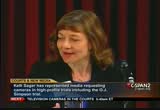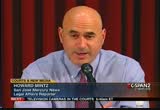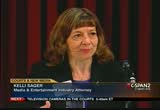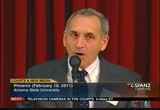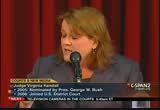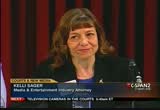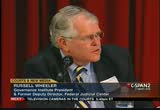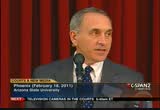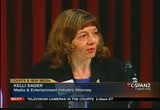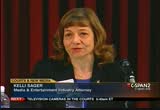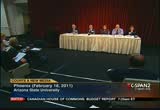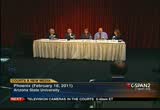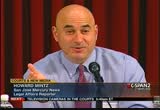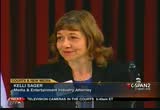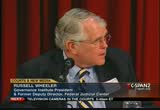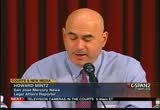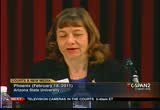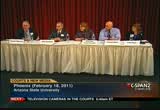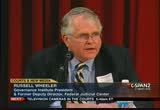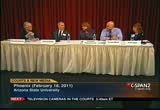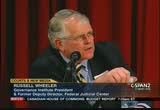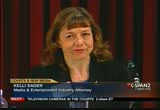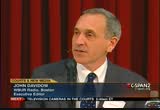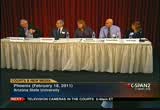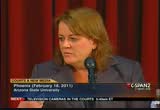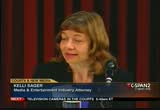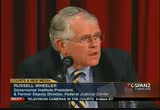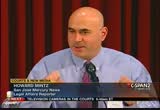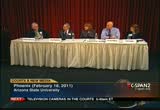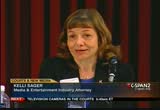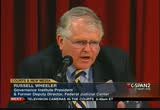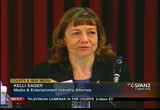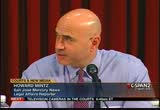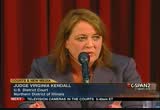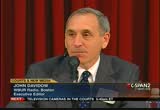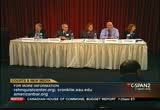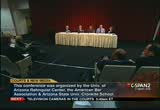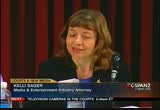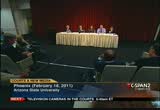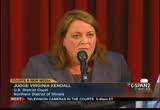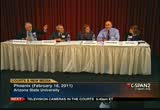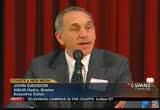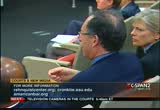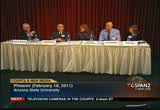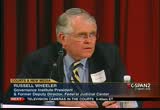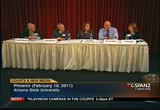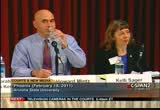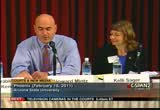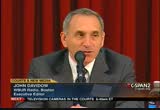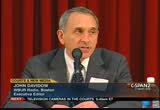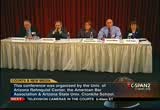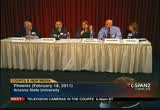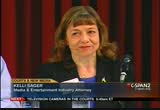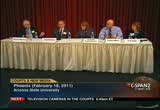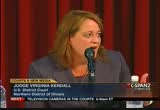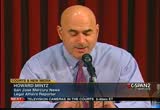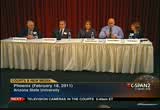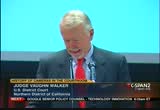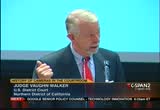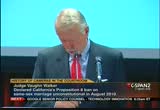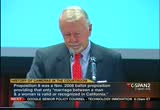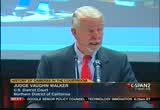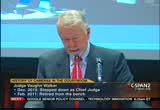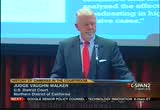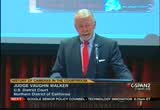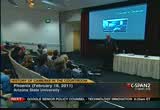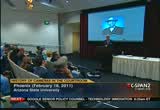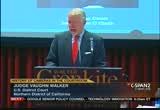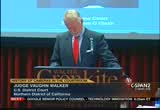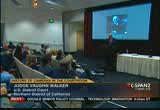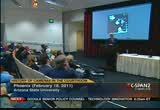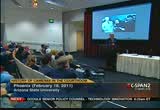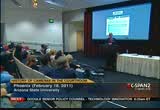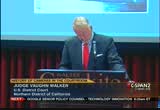tv Today in Washington CSPAN March 23, 2011 2:00am-6:00am EDT
2:00 am
generation of warriors, but not just this generation. warriors of previous generations spoke. whatever service they come from, all of us can see from todd nicely midsections the essence of the marine corps. semper favelas, always faithful. i am told the word poly trauma was not a word until this conflict.
3:03 am
3:04 am
i said i'll be in front of you filling up the tree and block you from offering amendments. he did, and i did, and there was unpleasant comments, but we stayed great friends through it all because i never surprised him, and i used the rules, and he used the rules. eventually, he prevailed. he went to the other side and got it done. i think that thing needs to be used with discretion and, you know, on rarer occasions because it makes it very hard to get even things that need to be done because the other side will go into the nuclear option mode and you get nothing accomplished. again, the bottom line for me is having served there, been in the majority and minority, we went back and forth between them, but when i came out the other side of it after 19 years, almost 20 years in the senate, i felt like
3:05 am
it was a pretty good place. one of my last night's in the senate, i had a long discussion, having one of these don't be voter amas. -- voteramas. we voted like 18 times in a row. john kyl, i think it was lindsay gray ham, chris dodd, and joe lieberman, and we talked about how stupid we looked. what was the problem? was it the rules of the institution, the institution itself? we were talking about all of that. i said no, it's not the rules. it's not the institution. the rules could be changed, by the way, to stop the voteramas which they should do, but i said, no, the problem is us. we're the problem. it's the leaders in the senate. we're not leading. when we get tired of this sort of thing happening, and we feel like it's out of control or
3:06 am
something needs to be done to change the rules a little bit, we're the ones to solve the problem, and i also said that i believe the problem is our generation. all of us were about the same age, mid-60s, we were there, ob feigned a -- obtained a political life, we all served in the house other than lind san -- lindsay graham. i think that the next generation won't be quite that much that way. i think they will be a little bit more -- a little less partisan in the way they fight every day, and a little more willing to reach across the aisle and make the place a more livable place. that's the good news about the future of reforms that may or may not take place. thank you, don. [applause]
3:07 am
>> dick baker. >> thank you, don, for that nice introduction. glad to be here, and i try to live up to my charter by starting with a gentleman name edward everest cale. he served as united states senate chaplain in the first decade of the 20th century. a popular lecturer, he was asked by his audiences what he actually did in the senate. do you pray for the senators, dr. hale? no, he responded. i look at the senators, and i pray for the country. [laughter] in the same vain, will rogers said after i read the ancient rome had a senate too, i knew then why it had declined.
3:08 am
[laughter] servers and senators also dined out on such stories at the senate's expense since the days of jornlings washington. -- george washington. in 1789, all sessions were conducted behind closed doors. those who elected the senators complained loudly. we elected the people, but we can't see what they're doing. occasionally members of the house of representatives in a spirit of helpfulness i'm sure proposed reforms. some offered a constitutional amendment in 1911. its preamble started "whereas the senate in particular has become an obstructive and useless body, a menace to the liberties of the people and obvious call to societity growth -- and that set the tune
3:09 am
for the rest of the amendments -- his resolution concluded with a provision to abolish the senate. it had supporters. the pressure for senate reform comes from the outside and from newly elected members who campaigned on a pledge to come to washington to fix the senate, but, of course; as senator lott suggested by the time they gain the seniority necessary to advance their proposals, some of then begin to doubt whether they were really actually needed as reform proposals. as with other complex institutions, reform comes to the senate spa ratically, partially with results that disappoint its most fervent advocates. there's some goals will never be done. some is that gives disproportion ate power to the smaller
3:10 am
states. this could only happen in the united states senate. that one, giving disproportioned power to the united states is hard wired in the constitution. it will never be changed. it's there forever. there's the entrenched tradition of unlimited debate, and as we have recently been reminded, further reform there is unlikely any time soon. i've been asked to mention a few historical examples in which the institution really did undergo substantial change whether by design or inadvertence. adoption of the first cloture rule in 1917 emphatically is not on my list. that was a shrewd move executed under great public pressure to diffuse citizen's anger to set up a mechanism for cutting off the bait. it required the unattain mble -- unattainable two-thirds majority and those serving had the
3:11 am
opportunity to speak for one hour each after cloture had been evoked. for the next half century after 1917, that rule 22 had very limit impact. here then are my three historical examples of major senate reform achievements. they come from the years 1911, 1946, and the period from 1975-1986. as a historian, i back off at 1986. we have too many close observers of that period yet to come. the one major flaw in the institution related to the senate is senators be elected by state legislatures. there's some writers today who don't think that's a flaw at all and it needs to come back. that particular provision became a breeding ground for corruption, bribery, and legislative gridlock. senator byrd's papers support
3:12 am
that appointment. right after the civil war, congress tried to fix the point with statutory adjustments but without success. in the 189 o -- 1890s they passed an amendment to provide for the direct election of popular senators. the senate had no part of that. other senators wanted to take no chances on having black american citizens control who might be elected to the senate. by 1910, however, southern states voting requirements had removed that threat by disenfranchising all black voters, yet, in that same year, the 1910 senate elections brought in a large new class of members committed to adopting a constitutional amendment similar to the one that the popularly elected house had approved. some of those new senators were house members. with the infusion of members committed to progressive era
3:13 am
reforms intended to bring the government closer to the people, the senate adopted that amendment in 1911. of course, by then, and this is a big of course, substantive change in the matter of electing senators really had been in effect for several decades. in an example of how senate reform comes from the outside, approximately half the states beginning in the 1880s had enacted provisions directing the legislatures to abide by senator primaries. this had deep roots, even back to 1789, but the year 1926 saw the first institutional movement in an tempt to fix the problem. it took the slow moving senate, 90 years to give approval to what in 1913 became the constitution's 17th amendment. my second historical example is
3:14 am
the legislative reorganization act of 1946. the exhibits over in the capitol visitor center are divided into six period. the so-called modern period begins in 1946. somebody tells you something about the ages of us working on the planning. one the main reasons for that, from the perspective of congressional history is indeed the 1946 legislative reorganization act, the granddaddy of owl congressional reform undertaking. it shaped the congress we are today. those reforms came after years of public hearings about how congress, a creation of the late 18th century needed the up to date tools necessary to cope with the challenges of a dangerous mid-20th century world. yet, to make that reform possible, it took a second world war and enormous resentment
3:15 am
among congressional leaders how they were manipulated by an increasingly powerful presidency. the 1946 acts major legacy lies in the exponential growth of resources available to members to adequately perform their responsibilities. for the first time, members in committees could recruit professional staffs and pay sufficient salaries to ensure that those staffs were at least as confident as those working for the executive branch. my third example begins in 1975, another year that would be a good candidate for the start of the modern congress. it was deeply influenced by the extensive congressional reform activity in 1960s. people in the room today were actively involved in that 1960s activity. in 1975, recognizing that it was about to experience a generational change, the senate established a blue ribbon
3:16 am
commission on the operation of the senate following a year later by its special committee to examine the senate committee system. in 1977, as the two senate floor leadership positions passed from the older mike generation to the younger hand of record by -- record byrd were ready for implementation. they inspired three changes. the first change was in 1975 under resolution 60. i asked staff members if they had heard about that. they looked at me like i'm from a different era, which i am, but this resolution was implemented to allow all committee members, not just the chair, not just minority member to select their support staff, a revolutionary change that pretty much is taken for granted today. the second change relates to an
3:17 am
effort to define proper ethical standard for senators. the senate began work on a code of conduct for members in 1959. in 1964, following some serious scandals related to abuses of financing, they established the select committee on standards and conduct. in 1977 as part of the institutional reform serge, the senate further strengthened its rules governing financial activities of senators and upgraded that committee to become today's select committee on ethics. now senators and staff are allowed to accept food from outside interests so long as they consume it with a toothpick standing up. that's where we are on that reform. finally, my final example of a culmination of a long campaign to bring change to the senate is the initiation in 1986 of gavel to gavel television coverage of senate floor proceedings.
3:18 am
it took 20 years to accomplish that objective, a vast change from the closed doors of 1889. -- 1789. you won't get unanimous agreement that it was supposed to, but it certainly is there. i would say that the long road to televising senate proceedings serves as a prime example of reform senate style, reform senate style, all capitalized that laid incomplete and not totally satisfying to all, reform nonetheless. thank you. [applause] >> john. >> thank you, don, and thank you to the woodrow wilson center for this. don gave me two missions today. one was to talk about public opinion or the senate's of popularity and the other to say
3:19 am
something how ronald might have been feted from his time in the committee. it is a rare event, so what did the president learn from his time there? on public opinion, i wish i could tell you there's a lot specifically on the senate. it really is not a subject that is asked broadly of the public. there is a lot on congress, and as you know, it's not very pretty today. last friday, gallop had congress' approval at 18% which the president who sort of has gone up and down a little bit since the midterm election in 2010, sits in the mid to high 60s. i think -- 40s. we've seen a trend in the ratings. they have been low, and they've been low for parties that control the congress, the base of a party often loses confidence in its congressional leadership much earlier than it
3:20 am
loses confidence in its president. after the 2006 election of democratting says congress is in the right hands, we have more confidence in congress that's going in the right direction, but that didn't last very long. now with the divided government, both parties find a way to be unhappy with the congress in a way that they are not as unhappy with their presidents. without that much public opinion data on the congress, senate itself, i just want to say a couple things about changes in attitudes broadly. one is about the 17th amendment, which is second. more generally this question how the senate fits into people's worries about getting things done in washington. what the senate today is seen as really by some people an obstacle to getting things done by a majority. how this changed is 30-40 years ago there was a number of walking points. don mentioned the three horsemen
3:21 am
of the apocalypse. more generally you can think of both the party system and a house of representatives were, at times, not completely ma senior -- majority institutions. my fellow scientists of the 1940s issued a manifesto saying the political parties were not responsible enough and we need a more parliamentary style government saying if you elected a president of one party, they should have a platform, know what they stand for, have the opportunity to put something into place, and we voters at next election can say, well, we agree what you have done, have done it well or not, and express our opinion in the next election. those political scientists and others felt majority was not being expressed, and that was not simply because of the senate. sometimes the senate was implicated, but the house, the house rules committee, the political parties themselves. now, the democratic party in
3:22 am
particular was a funny majority party with a large progressive left wing and a small to medium size right wing and cross party coalitions, and that system which many railed against has started to dispate, and as our parties have become much more clearly ideological and more clearly left and right with different positions, what's left is the senate much more exposed, much more exposed of the body because of the supermajority requirements in some cases as the body that stops dedicated majorities from getting what they want. clearly we've seen this in both parties with 2005, in particular, republicans worrying about democrats opposing judicial no , nominees,menting to stop -- wanting to stop a president of the same party from the judicial office that they chose to select, and, of course, we've seen that in the last congress with the democratic majority
3:23 am
frustrated by even when they had the 60 votes worried that it was really too hard to get what a significant majority across the house, the senate, and then the presidency wanted to get done, so the senate is much more exposed as the body that is seen as the one place where democratic wishes and democratic programs, not capital d, but frustrated. it is something of an endty to worry about polarization. political scientists of the 40s worried about no responsibility of parties, and now it's the polarization, the strong views on both sides, the lack of agreement, about the need for bipartisan cooperation, and it's hard to find that. the senate is sphiems the -- sometimes the land of gangs.
3:24 am
i don't think senator lott will show us any gang tattoos, but you do, in the senate, have the ability to have small groups of people, often in the middle, groups of republicans and democrats coming together sometimes not with the blessings of their leaders, but finding ways to come to agreements. the gang of 14 referring back to 2005 when there was a group that on both sides of the aisle worked on lessening and not making large changes in rules which some were proposing. i think today, the gang of six, another gang looking at our important fiscal problems. a gang of republicans and democrats who buy their place in the middle might shape what a future compromise is so the senate does have frustrating aspects to it in terms of the
3:25 am
ability of a dedicated majority to get its way, but it also has the possibility of reaching across the aisle and allowing larger coalitions to address our larger problems. the 17th amendment, i have a few things to mention about it, and i'm glad richard mentioned it. it's come back as a political issue. there were some conservative academics who sought the cause, and i think the main argument and the worry on their part was that we are forgetting our federalist roots, forgetting about the role of states and too much emphasis on washington, and perhaps a return to the old system where state legislatures elected senators rather than the people might cause senators to be more concerned about what was going on in their states, but their state legislate ors -- legislatures cared about their people. that has now reached a political issue. i know in the senate convention
3:26 am
in utah, senator bennett who ultimately lost was the only supporter among the candidates on the republican side who was a supporter. the others thought it was not a good thing, that we've gone too far in washington, and maybe we'd be better off going back to the roots in the states by allowing state legislatures to elect those senators. i guess i'm not for that, and i don't think it will spread wildly enough to have an amendment repealing that, but i will note on the democratic character of the senate, yes, in many ways there's antidemocratic features, but senators as popular elected figures are better known that their house counterparts. more people know their senators. those elections drive larger turnouts sometimes when there's no a governor on the ballot. there's a certain kind of more democratic character to the senate because of that, and i
3:27 am
guess i would ask those who advocate getting rid of the 17th amendment or whatever whether the senate could with stand the pressure against it if it were undemocratic in that way as well or less directly democratic because they were elected by state legislatures. how many countries around the world have an effective second chamber? many of them don't have a second chamber at all, and others have kind of archaic second chamber, one that might block something or in the case of lords, minor powers which if exercised to the fullest extent leads to their abolitions. having a second chamber with the ability to have a different sort of a majority reflected does give it greater legitimacy than it might otherwise. finally, did the president benefit from his time in the senate? i often get to speak to foreign
3:28 am
audiences, and one of the favorite lines i have to amend and before president obama was elected, i said four of the last five presidents never held a job in washington before they became president. presidents reagan, carter, clinton, and george w. bush had all been governors, had not worked in washington, and how could that be? could any other country say that, the leaders of your party becomes prime minister, could you say they never worked in the capitol city? it's a strong tendency for us to look to governors, outsiders of washington, to look to people with executive experience, but the president was elected. he was one of three in recent times who came directly from the senate to the presidency, and one thing he gained from that experience, even only four years, was an appreciation for washington. i mean that in a good way that several presidents before, especially as the predecessors,
3:29 am
carter, bill clinton, really came to washington without a strong as connection to washington, as real outsiders. you saw that in how they picked their chiefs of staff and dealt with congress and how they had a rocky start, especially with their own party in congress. i think the president, in many ways, had benefited from his time in the senate, his closeness with senator daschle, the staff he hired, and the ability for a young president to look to experience in washington who are more experienced in key positions. the one area which i think i just want to leave open for future debate at the end of the obama presidency is thinking about the president's strategy and where he sees the senate in that realm. the bush administration was kind of interesting. i think that fits with today's polarized politics, with the house of representatives strongly supportive of the
3:30 am
majority. president bush had the house of representatives often in this case, i don't want to say rubber stamped, but pass the agenda with much in tact, and the president was the place where the deal was cut taking 80% or making a compromise. i think president obama on health care and a couple other areas found himself going back and forth between the senate and house. hadn't skerred his program in the house, found the senate might disagree, and the house wanted to renegotiate things, and i think one can imagine in the senate of today, where the senate is a tougher hurdle to pass, the president's might be likely to follow the bush model used in many cases. the house, more parliamentary body with the president, the senate as a supermajority, # a little negotiation causes the president to turn it into a sales event, and the president says i need to make a deal, i need to get to that point, and
3:31 am
that's where the final deal will be cut. on that, i will say thank you. [applause] >> janet? >> you know, i'm so short. would you mind if i sat down? >> you may. >> i didn't get you the stool to stand on. >> you know, i'm glad john was commenting on president obama and his role in the senate. i just got a great window on what obama's view of the senate is right now. over the weekend, president obama attended the gridiron dinner, the annual white tie dinner the press has and the president addresses them, and he had a great last line about the senate which was he said, you know, the last time i was at this dinner was 2006, and a lot
3:32 am
has changed in those five years. back then, i was a newcomer who couldn't get anything done in the senate, and now i'm a president who can't get anything done in the senate. [laughter] he sees it as -- the senate was a big obstacle to president obama wanting to pass his agenda even with more democrats there, but i have to say, you know, from president obama to sort of the public opinion polls to, you know, my fellow journalists, there is a lot of congress bashing. it's really easy to -- well, no, i won't put it that way. it's very hard to love the senate as an outsider. it's a very kind of archaic in its ways in exrensble. you turn on the tv, and it's on c-span, and nothing is happening. it's a hard place to understand let alone love. i have to say i've covered it long enough i see glimpses of
3:33 am
people who love the senate. when kris dodd who -- chris dodd retired and gave a final speech, there's a man who loved it. you could feel he thought this was a machine capable of great things, and in his final months in the senate, he had a big hand in some of the very ambitious accomplishments of the senate in taking the lead of writing the health care bill and the wall street reform bill that went through, but anyway, it being a very complicated hard to love and understand constitution, i -- institution, i felt my role as a correspondent is like a foreign correspondent to the rest of the country, to my fellow americans, this is what's going on, and it's a job that, you know, a lot of people have, you know, asked me, how can you cover congress for so long? don't you get tired of it? i have to say, you know, there are a lot of jobs in journalism
3:34 am
that you kind of -- i don't know, maybe this is self-importance and i think understanding congress is an important thing and it's a service to provide and not making fun of an awkward institution, but helping people understand what they are doing that affects people's lives. i love the question of this. is senate reform an oxymoron. why i love is it in journalism, in daily reporting where we are to be right down the middle, we can't use the word reform or talk about senate reform because it implies that you support what's going on, so it's restricting filibuster senate reform, well, only if you think the filibuster is dead. writing about tax reform, everybody talked about it, but we couldn't call it reform because that implies it's a good change. we have all these, you know,
3:35 am
synonyms we use like tax overhaul or revamping the tax code to be neutral about it all. you know, my feeling is when people now currently talk about senate reform, they are mostly talking about the filibuster and the rules, but i think the question is can you have senate reform? really, all we're talking about is can the senate change, you know belter for -- better for worse, but that's a value judgment. the senate has changed and quite a lot. the rules change slowly for the reasons that my fellow panelists laid out pretty well. part of it is in the institution and it's an institution that loves tradition. you can bring in all these new members who want to challenge tradition, but they are usually ipso facto to people who love the tradition, and i actually --
3:36 am
i started my compleer covering congress as don mentioned congressional quarterly, the trade publication of capitol hill. we covered the procedural aspects of it, and rule changes generally are hard to write about because it's inside baseball and complicated. i came to know quite a lot about it, and i was interested in it. when i left and worked for the l.a. times and then the "wall street journal," you know, it you just don't get to write about it that much. this year really, and in the last two years i would say, senate procedure got to be a much more interesting political story. i mean, people outside the dome cared about it, and the pressure for the senate to change, i felt what was most interesting for the last couple years in the latest efforts to change senate rules and the criticism of the filibuster is how much it came
3:37 am
from outside the senate because, you know, year after year after year after year, you can hear people complaining about the filibuster inside the senate if you're in the majority and trying to get things done. if you're in the minority, senators are inclined to like the filibuster, but in the last two years, you heard a lot -- and it was a reflection of, i think, of a lot 69 complaints coming from the left and the democrats who were really, really frustrated in the first two years of the obama administration, here the democratic party had commanding authorities in the house and senate and just couldn't done what they wanted to get done, and so in many ways it was a function of the fact that democrats had 60 votes that the filibuster was that much more frustrating, you know, because why can't we do what we wanted to do? there was this sense of it wasn't -- it was kind of a -- in many ways the pressure to change the filibuster reduces when you have a narrower majority because
3:38 am
people, the parties have to work together and form bipartisan coalitions, but as long as democrats had 60 votes in the majority in the senate and house, there was this perception you could accomplish something, but now that can't happen, but i thought it was interesting then that the filibuster debate came to a head this year after the democrats lost their majority, and, you know, it really was a classic case though of there being all this steam, lots of new members proposing things, and then harry reid and mitch mcconnell formed a gentlemen's agreement, we don't change the rules, just agree to do what we want to do. as don mentioned or i think it was don that mentioned the basic agreement was that mitch mcconnell agreed he wouldn't, you know, republicans wouldn't
3:39 am
support filibuster on just bringing the bills up and that in exchange, reid would allow more amendments, which kind of depends on what you think the problem is with the senate whether it solves it or not because some people think the problem with the way the senate works is things take a really long time, and there are others who think the problem is that, well, they just don't vote on things. you know, they filibuster and they just don't get to the vote, and then there are others who don't like the senate because they don't like what the senate accomplishes, but that's a political and not a procedural decision. i'm here to report on the results of the first two months of the gentlemen's agreement, and it solved one problem is they are voting on a lot of stuff, but it does take a really long time. for example, they took up one of the first bills harry reid brought up what seemed like a routine authorization bill. i guess it was a big deal though authorizing the federal aviation
3:40 am
administration. it doesn't sound like a big partisan thing, but he brought it up, and mitch didn't put up -- the republicans didn't put up any proceed churl obstacles, they voted on it and it took three weeks. i don't know, but it took awhile. they allowed a lot of amendments, and to their credit, a lot of the amendments had to do with airplanes. [laughter] some of them didn't though. for example, it was during the debate in the faa bill that the senate voted for the first time and repealing the health care bill, the health care law, so they got their vote, and it had nothing to do with the faa, but they got the votes. they had a couple other off-topic subjects like they also voted on, you know, repealing the davis bacon witch standards act, but for the most part amendments about airplanes. you know, you can say the senate working the will of the way it
3:41 am
was supposed to, but it took three weeks. they did a patent reform bill, another big important bill, but there is a sense that the gentlemen's agreement is producing debate, both amendments, but it doesn't speed things up if that's what you're interested in. the comparison is don was suggesting i talk about the difference between covering the house and the senate. now, reporters are people, and we do like to get home to our families so the thing we really hate about the senate is when the debates drag on and on and on into the night and, you know, you never know when they are going to take the vote, and i'm telling you, there's one question that editors have asked me throughout my career that i just got to tell them i cannot answer the question and the question is when it the senate -- when is the senate -- they might have been the first leader to come up with the idea of like saying at six o'clock we're not taking anymore votes.
3:42 am
the biggest difference between the house and senate is kind of predictability, the house rules committee sets a lot of ground rules for floor debate. you can have x amendments and you get one hour debate on this and that. the senator is much more free form and free floating. there was a rollover when the house took up the continuing resolution, john boehner made good on a promise to allow an open rule, and they took all week and offered hundreds, hundreds, i don't know, yeah, hundreds of amendments. did you get the number? >> 583 filed, yeah. >> i was with the experts here. you know, it was really interesting. it was a little bit chaotic. ..
3:43 am
bipartisan votes which is to say a bunch of moderate republicans joined up with the democrats or tea party republicans join with liberal democrats to kill the defense project or something like that so it's much more interesting you've got a much more nuanced reading politics in a wide variety of issues from the reporter's perspective i like things better interesting and important, and so i guess that's why i cover congress.
3:44 am
anyway, so with that i think maybe it's time for us to hear questions. >> i would call on you to follow-up on the other says since he went first. >> it's interesting and relevant to this discussion. you think the f. a. a. bill -- i work on that when i was in the senate in 2007. the same bill. it had been pending since i think 2006 they had had 17 extensions of the old law because they couldn't come together how to move the federal aviation administration order to the next generation modernization of our air traffic control system. the problem was there had been troublesome amendments in vetted in that bill all along and they couldn't come up an agreement on how to pull them out because they couldn't pull them out competent centers like lamarca alexander of tennessee said if
3:45 am
you bring up this bill, that piece we will filibuster and so it had been gridlocked reliefer i think five years. what finally happened is they said we need to get this bill done. they went in with a bipartisan group and took out a troublesome mostly labor amendments but other amendments, too, took those out and it passed, showing once again that the senate was slow and cumbersome. it will quite often have bad stuff stuck in the bills the process eventually produces a bill that is a consensus bill. what held up for three weeks first of all they had retrieved some of them had to go to somewhere out of town but also there was one amendment still very troublesome, was in the labor amendment. had to the perimeter rule where how your plans comply at the ronald reagan national christa country? that is the substantive issue that held it up in the end they got a bill that had been hanging around five years and finally
3:46 am
got it done probably right. now it's probably a show of itself but what it should have been but still it is a very good bill. it's the same thing with patents. if the marketing of patent reform for i don't know how long, janet, how long you've covered it, and finally, in the last time we headed up by the close 2006 there was a big shootout with of the pharmaceutical industry on one side in silicon valley on the other side. they wanted reform but they couldn't agree how to do it and finally they got it done in a consensus right now the house still has problems with it. that's a couple examples of where it is ugly and slow but forces them eventually to quit being partisan, pullout the troublesome amendments and produce a product. the ever is on the open rule speaker boehner i think it was a brilliant move the first bill of the year controversy will bill, both rules go at it, boys and girls have fun, degette fun come hopefully that is the last open rule you will see. [laughter] >> reminds me of when new
3:47 am
gingrich asked his republican conference with the one to the contract with america to back and they said no at the 100 of the mark was enough for them to the same idea. i seem to remember the issue of how many planes could fly it's always been important to members of congress for some reason because we want to fly out of ronald reagan and the local people say you have to fly out of dallas, so it is always a big issue out. but also speaking of the old rules, one of the adages i always had is the process is substance. process or procedure. if you don't understand procedure you're not going to get a bill. it doesn't make a difference with the substance is. and so when i was in leadership positions on used such a process clearly to thwart the will of others or to do the substance bill i wanted to process really important. in the house, but even more so innocent at.
3:48 am
and one question that comes out of all of this everybody is advocating change. does the senate really need a change? no, i don't think so. can't you find improvement or, you know, are there some problems? you're always going to have some of the prairie. the secret is to understand the rules come understand the institution and learn how to make them work not only for you as an individual senator, but for the country. i used to get in trouble in my own party because i became known as a compromiser. [laughter] this is bad. yes, he will give and take. look, this is a legislative process and if you look up legislation in the dictionary it should save the art of compromise. when you are dealing with 100 egomaniacs -- and i say that affectionately because i was one of the -- at least 98 of them thought they should be present. i don't know who the other juana was other than me who doesn't think he should be president but you cannot just say this is the
3:49 am
way it's going to be. it's my way or no way or the highway as my partner used to say. that's when you'll get, the highway. he will get nothing. and so you have to find a way to get to a solution. do you have to give up your principles and philosophy? no. but you have to always start here on the right of center and my colleague on the other side of the ogle whose the majority and minority leader, democrat, tom daschle, populace, i was a southern conservative republican. and then we started to say okay where can we get to the sweet spot that is good enough for you may be some time if i had the votes i would actually go to, and say, is this something we can tweak this where it would make it easier for you to sell to the conference so we can get a result? and by the way, one thing you need to notice about the senate, too, you may think that it's slow and ponderous, never moves
3:50 am
when it wants to it can move like lightning. after 9/11 backend loaded the history of the patriot act. a lot of people say hagee move like lightning and took away individual freedoms, too but that is a case where tom daschle and i talked on the phone and we agreed we needed to get it done. i was talking to him on the cell phone outside of the republican conference on his cell phone outside of the democratic conference and we agree our conferences were not ready to move on the bill and we agreed it needed to be done and needed to be done then and i said i will meet on the floor of the senate. two hours later it passed. so the senate when it wants to can act -- you talk about legislation one year after we got the senators leave, tom daschle evan bayh passed 47 bills that might by unanimous consent. just to a fuss. we had a grand time. [laughter] >> because he did that we never
3:51 am
leave it the vehicle left. [laughter] >> that's when the good stuff gets done. >> just remember, it is when it wants to move fast it can. >> you were talking about change and reform and how it's sometimes it's used to much as it's a good thing and i remember lloyd cutler is in custody but the it was unconstitutional and quote did somebody in the bridge reform debates who got up in the parliament and said reform, reform. that's all we hear as if things were not adel ready. [laughter] and i think that's the attitude some members of the house and senate have towards those who might want to drastically alter the way things are done. but in any event i think that it is time to open -- time to open things up for questions. raise your hand, we offer a microphone and then give your name and affiliation.
3:52 am
>> not everybody at once. >> right here in the front with this lovely young lady. your wife? you're really starting to get some brownie points here. [laughter] >> [inaudible] looking for some background of why the senate doesn't have any germane rules and whether it is posing some kind of -- >> you're talking about the rule msm at? >> yes, actually whether that would help to move the body. >> that is one of the things that i occasionally suggested and probably what makes senator byrd mad at me. one of the difficult things in the senate or one of the good things in the senate is you can wander out there on any bill at any time and offer any amendments you want to whether it is germane, relevant, related, paid for or anything. not if it's under the paygo rules that you have those, theoretically someone might object, you might have the order on budget and all that sort of stuff, but that's what really
3:53 am
makes it difficult to produce good legislation and what makes it difficult for the democrats or republicans because what's going to pop out of there. that is the reason one of these gentlemen's agreements between the leaders do matter quite often turn up the bill i used to come to harry reid when he was with and i was in the leadership position every time i would call it a 100 amendments would pop up. 100, usually the same but there they were at 100 amendments i would say we are going to get these appropriation bills done and have to move these things. help me, and there were a bunch of republicans and then he would go out and would come back and say and i would say i've got eight over here on my side and i will show and you can show me yours. no ugly intention involved there. so when i would show him my eight there would be crippling amendments they didn't want to vote on, and he would have his
3:54 am
38 and some i wouldn't want to vote on and the next thing you know, we would accept 17 by unanimous consent and get down to the vote on seven or eight amendments and so we would clean the deck of all of these long germane irrelevant amendments. but again, as much as i hated it in many cases i wouldn't change it, that is the senate. this is the unique character and nature of the senate and the rights of the senators and the power of the individual senator sometimes you get so mad at one senator one person and boroughs of the whole senate and it doesn't take a senator long to figure out he or she can do that it tends to work itself out and give it the appropriate attention. >> the rules of the senate reaffirmed by thomas jefferson's procedure published in 1801 said the debate is not to be teachers or beside the point.
3:55 am
basically that's been interpreted to mean the debate needs to be germane and as the senator lott points out that lasted all of about five seconds how do you define germane and force the senator to sit down by saying sorry you're not speaking on the plate and senators would always say i am speaking on the point if you just give me a chance to get to my point the take awhile to get there and do it. so the germane in terms of the eight went down the drain pretty early. other questions. rick back there. yes. >> i'm with the congressional research service and i wanted to ask me be anyone on the panel something that's concerned before a long time about the attempt to control the hold
3:56 am
process and that is as long as you've got the threat of a filibuster, then it seems to me the leadership has to pay attention to the notification that somebody is going to be willing to filibuster something. whether he follows the rules and makes it public or doesn't follow the rules and leaves it secret, and in fact if there is a rule that says you have to give notice of the holder and it has to be public, well then he says this isn't really the hold, but or as a staff friend of mine put all he has to say is this is a nice little nomination you have here. would be insane if anything happened to it. so, how are you going to be able to control the holds without controlling the filibuster? and if i can have a second of a rather different kind, i wanted to ask senator lott because the
3:57 am
media accounts i've read indicate he might have been the originator of the description of the nuclear option, and i wanted to know if he could say anything about the nuclear option that he thinks makes it nuclear. [laughter] >> okay. on the holds, we better explain to the tv audience with the holder is. >> the hold is where a senator notifies the leader or the leadership he or she wishes to be notified when this amendment or this bill was going to be brought up for this nominee so he or she can come over and discuss the issue or the nominee at flank. this is the leader's biggest nightmare. harry reid -- connaughton i'm sure he has to deal with a democrat threat on hold. now, i had it on my side and the problem is the one thing the leader and the senate doesn't
3:58 am
have is kind, and by the way i think it is a selfless jon rand that is why i would hold public criticism of harry reid because i know he's got the toughest job in the city. the president makes a decision, thousands of people in the executive branch move, and the house, speaker boehner or speaker pelosi they have the rules made and to control the rules committee you control the place and when the speaker makes a decision, the chairman of the rules committee acts on it and controls time and what amendments can be the leader in the house and the senate doesn't have that. it's not a constitutional position. you run the senate by tradition and respect for the position of not for the person himself. so, it is a very difficult job and holds stopped the place. but one of the things -- if you have the luxury of time you can predict, and what i used to do it now and then if i would have some republicans in the word over by a staff member and quite often i would find out it was the center it was a staff member
3:59 am
that is one of the problems in the senate has said i want a debate i would say come over here and debate it. get over here right now they are going to have to take the floor and debate it. it's amazing how many times that would disappear because it was quite often 5:30 come 6:00 or 7:00 at night and i would say get over here you have to do it. now, the end of recession you don't have that luxury. one time i got tangled up with senator kennedy, and the senate when senator kennedy was there he was going to take him on you better bring your lunch because it was going to be a long time. and one of the changes they made this year is one that he invoked but it was the end of the session, 1996 and it was a labor issue and he was -- it was going to change the labor provision and he was going to block it, and the staff leedy that was as the director said you can't do it because he's going to block
4:00 am
it. i said why can't i? she said because you have seven cloture motions. it will take days to bring get, and i said well i don't care. we are going to do it. i wound up keeping the senate there an extra week over this one issue and the step one that he took and this was on thursday night, she demanded that the bill be read and did and they just have reform on that? >> it's available 72 hours -- he couldn't have done that objection under the new rule and so i said tell him to start reading so i went down to get something to eat and i tried to make the senate a decent place to live and work. it's very hard to do, but 20 minutes until nine the word came to the dining room senator kennedy said that he would not do that but he would invoke his rule which forced me to keep it over another day and i wound up going from thursday to thursday to break his objections, his
4:01 am
holds and the vote by the way was 98 to two. but the leaders don't have a week to break the hold ordinarily. you have to be a hardheaded, baldheaded leader and have to have a cooperative conference to do that. i have been blamed me even i don't know who came up with it, but apparently somebody found the first time of the term the nuclear option was used with regard to the confirmation or filibuster of the supreme court justices i must have done that because i got attribution for it. and the term was an ally in the wish it this time i always want to do was that if you did it it would blow the place up. if you enforce the vote at one point we had the vote to invoke the nuclear option. we had 51 votes. but that depended on what was going from the chair that by the
4:02 am
majority vote to could change the rules in essence and get rid of the filibuster. >> i have a few problems with the parliamentarian as you recall. but at any rate here is the thing you need to understand about that. i really didn't want the nuclear option. i really didn't think that they should filibuster the supreme court justice. but -- he may deny it but the person that came up with the solution was laura alexander and then there was a sight group created called the gang of 14 which i was flirting with but i could not -- at that time i couldn't be in the group because i would look like i was undermining the than majority leader so i went to john mccain and said john, i can't be in the middle of this. so i need -- we need you to go into it and work out the language and enforce the solution which was the gang of 14. a few in the media recall and know and can be confirmed by susan collins was that i was involved not only in the term
4:03 am
nuclear option but the solution that avoided the the nuclear option. so that is the kind of thing in the senate you have to do. you have to sometimes you have to suffer the strong man and then find a way to knock it down so the senate can act. does that make any sense? okay. >> [inaudible] it does make sense. [laughter] >> i am john from the university of michigan. i think someone ought to be more critical of the senate and you all have been so i will do it. >> go ahead. >> john said that the public has the dim view of the congress and it's true mostly a public opinion are asked about the converse, but mostly they are not happy about the senate. the house actually does its
4:04 am
business. they send bills over to the senate. last year they sent 400 the senate never acted. it wasn't that the just voted down. they never even acted on them. they didn't pass appropriations bills and so on. i heard that kind of criticism from house members back in the 1960's when i was interviewing house members, and i think they would say that it's gotten a lot worse. senator lott, you said it was 100 egomaniacs and he said that was -- -- well i take it more seriously. i actually think that that's the really big problem for the senate. mostly senators get there because they know it's a place taken individually through the weight of now. as opposed to having an institution that's actually going to accomplish something. i mean, your story about kennedy
4:05 am
holding up the senate for a week and then eventually the thing passes 98-to, most observers looking at that would say that's a ridiculous way to do business. that's ridiculous. and the reason that i wanted to say something about this is that i think this has gotten to the point that it's not a filibuster. it's beyond dysfunctional. i think it's dangerous to the country. it is dangerous when the public gets this angry. i think it's really powerless. >> thank you. let me before anybody else response, let me just quote from an excellent book i would highly recommend called herding cats the life and politics, but this is -- you start out at the beginning when he first got to the senate saying it was the most frustrating place i had ever been in my life. the process was glacial messy and unpredictable and all like to go along and make a list of things i would change in the
4:06 am
senate when i had the opportunity and then at the end of the book this is after you've stepped down as majority leader and you're about to go on the rules committee as chair and looked at some of these rules use it needed looking at. you said the senate had become increasingly dysfunctional. some people argue it had always been that way but the gridlock has worsened over the years as the body we have become mosul weld with such rules and whites that the senate has become almost impossible to manage. that is what i think it means. you used to use another metaphor i think about bullfrogs. what did you say? use and dealing with the senate is like keating bullfrogs in the barrel. you get them in there and then one jumps out and you just can't keep them in their they keep jumping out and that's one thing about senators, they are pretty experienced hands. a lot of them don't come to throw their weight around. a lot of them come with high goals for their country and what they want to do, but once they
4:07 am
get their they do realize the rules and the power of the individual center. i didn't realize how much it was true until i got there but also with senators, a lot of the centers have been congressman, governors, they are a little older than the house and more experienced, and you can't put them down. i was a whiff in the house and the senate, and when i was the with 196 republicans it was easier to count those and count on them standing where they told you they were going to begin to count 46 senators and count on them being because first of all they were smart enough to know i'm not going to tell you until i see the whites of your eyes and realize i have to vote, so pushing them to give you an answer was hearty enough. close sometimes circumstances change, constituencies, that of different demand and they wouldn't stay in the beryl, they would get out from where you thought they were going to be and they would be in another
4:08 am
position. go ahead. >> can i comment a little about the frustration the voters feel that the senate in particular but i think it also does play to the house it's really different and opens up the potential for a different kind of pressure for reform which is all i am astonished how much more people know about the details of what's going on in congress. i mean, the internet and on-line access to information and it's easier to watch stuff. committee hearings and roll call votes. people are much more aware because before the senate was on television, who knew, and when it was done so whatever the pathologies of the institution are i think they are out there a lot more and i had a couple of -- it's been kind of devolving but i have a couple of recent examples that brought it home to me because i was talking to house republicans about the influence of the tea party which is they were involved in the election and i wonder how much they communicate with members as
4:09 am
they are governing as opposed to when they are campaigning and one of them said on was very heavily lobbied by the tea party people on the decision about the committee chairmen. now the committee chairman was light the inside baseball of all inside baseball but it did make a difference who was freed the chairman of the appropriations committee, who -- was it going to be a good boy? in the and i don't know how much lobbying mattered -- >> energy, commerce -- >> but just the fact people were aware of that, just i think the institutions are more transparent and subject to people when -- they are sort of their opinions and ability to express what they think and the second example in the house is voting on the continuing resolution, eight cut like $60 billion which was a lot of money and the democrats opposed it but there were some conservative republicans that wanted to cut another 20 billion was sponsored by the republican
4:10 am
study committee, and the amendment to cut more went down, but it went down because -- 92 republicans voted against the traditional cut so it was an interesting vote and right after the past eight they went after their town hall meetings for their august recess or whatever it was, winter recess and they reported people showed up the telhami thing is knowing that 92 republicans voted against this amendment and they knew whether the member of congress voted for or against that amendment and the was information spread rapidly in the this is an accountability, the voters going home and so i don't know i think it's good that people know more about how the congress is doing -- is working, what it's doing and what it's not doing and so i don't know whether that creates another force for change or on a filibuster or anything else, but
4:11 am
i guess i believe more information is good. >> and what you were saying i was talking to the good old boy priest retired school district in my state recently and they have got a new member of congress and they had those 500 votes, and he observed how the new congressman had cast seven votes against what was the tea party and leadership position. i mean, he knew that this individual congressmen voted seven times against the wishes of somebody. i was staggered that this guy -- that he's sitting there and actually watched c-span, the watched fox or msnbc, and they keep up with what the senators are doing. i guess that's good. it's a little surprising and scary for the congressman. >> you are absolutely fried the number of people watch has grown
4:12 am
but it's a relatively limited public. it's an activist informed public that doesn't stand as wisely as the average voter doesn't know what's going on in congress. but more generally i'm glad you brought up the question because you're right the panel doesn't reflect what was a very strong anchor against the senate. my point was that the senate is now bearing the brunt of what might have been addressed and parts of the house or party system before the senate is in the last dedicated majority from getting what they want. the other question to ask this it really is whether you want a kind of a system of party government or whether you want a kind of hybrid system that we have come and whether you like the polarization. in many ways people do like the politician and the clarity of ideas and ability of the party to come and put their stamp on things but the senate if you
4:13 am
think about the simple point of the football field the way the house acts it's not so much the house has to please its most democratic side, the most conservative member to get something through. often there's a kind of enforcement of party discipline in the house that didn't exist when the caucus was much more desperate and so the majority decision coming out of the house of representatives is likely to be around 25 or 30-yard line of the political spectrum than it was 20, 30, 40 years ago. and if we switch parties, switch the whole house and senate to the other side and parliamentary system we could expect it to shift more 25 or 30-yard line of the other side. the senate if it works does tend to force you to go out and get somewhere in the 40 to 50 arlan. maybe the parties are too far apart and trying to get that one member from the other side means you have to go so far that you to compromise your principles.
4:14 am
what do the to but the danger of falling apart government line too far down the road is we are going to have relatively more left and right control of government and big swings whereas there is a kind of consensus makes you move to the middle. >> i was thinking when you brought the question not about john and elizabeth's book, versus public enemy where they were operating under the assumption that if people knew more about the congress and which operates, with the process is and so long they would understand it more and tend to support it more and they found just the opposite in their polling and said to know them is to love them and they found out the grease content and the was the sort of conclusion they came to so it's kind of an interesting point i think. >> if i could this could spark a debate so i don't need to be doing that, but i would maintain people were as every bit mad or medium more at the house and the proof is in the putting the
4:15 am
changed the majority in the house. they didn't quite get it done in the senate and i am just so thankful the senate didn't pass that garbage the house was sending of the last two years. how many post offices were not named as a result of that? but just so that i will -- picking up on what you did in my book i do think that the senate -- part of the problems they are balanced. you have to pass a budget every year although they didn't pass one last year you have to pass every appropriations bill every year. a lot of authorization bills are one-year authorization bills, spending exhibit today. i was always an advocate of the budgeting. i can to could do it a lot of different ways but budget one year and appropriate the next and i am for the multi-year authorizations. five years, seven years so that the organization, the entity that you're off uprising, the committee or the department or agency knows what the rules are
4:16 am
to come three, four, five years. so i do think that there is a term if you're in the stream water there is a horse that is so muscular he will jerk his leg and he can't do what he needs to do. that is what the senate has become, it is emotionally down and it has too much and the need -- the only way you're going to get appropriations bills as the leader has to make a decision hopefully with the corporation of the minority leader to do nothing appropriations for at least half of may and all of june otherwise you will never get it done. you know the last time we got every appropriations bill done before the end of the year? 1996. we did it in 1996i believe or maybe -- but it was because we made the conscious decision we are going to get these things done and by the way you go back and look at the record, that year the congress adjourned
4:17 am
october 4th for the year, and that you're the days incision was only 132 yet if you studied what happened that year it was mentioned said if the date a safe drinking water, portability of insurance, every appropriations bill, budget, balanced budget, tax cuts, welfare reform all in that year and as a matter of fact, the last 20 years that is the fewest number of days with one exception. 132 days over the last 20 years and yet one of the most productive sessions but it takes strong -- the leader has to say we are going to do this or we are not going to do anything else and you have to push the envelope and it takes the corporations on the other side of the aisle. one other thing i just saw complicity i filed 82 cloture
4:18 am
motions in 1995, 96 brackett. only 50 actually had votes on the culture and only the cloture to stop the filibuster succeeded nine times but i kept chipping away at it and by 2001, 2002 we had moved the cloture to actually stopping the filibuster but it up to over half, 61 cloture votes, 34 succeeded. so again, it can be done. but it takes focus and determination particularly in the senate, but it needs reform just to allow them to be able to get the job done. >> you're going to get the award for that number might. [laughter] >> with that we have come to the hour of six but i want you to join us in the atrium outside
4:19 am
4:20 am
4:21 am
accomplishments and accolades so my introduction as moderator is great to be very brief and i would encourage you to read there will biography's available on the web site. the first panel new media is a changing conduct of the proceedings and moderated by russell wheeler president of the government institute small think tank with special interest in the relations and the fellow in the brookings institution's government studies programs. he's also a nationally renowned expert on the federal courts. >> thank you very much, sally. let me briefly introduce the panel three it right down the road. john david is an executive editor with wbur, the npr station and the director of a project called order in the courts, 2.0, which we will be using the quincy district court as a laboratory to explore the interface between the new media and the judicial system,
4:22 am
virginia kendal has been a u.s. district judge in chicago since early, 2006 and before that she was spent over ten years as the senior positions in the u.s. attorney's office in the northern district. how word mince has covered court in california in the bay area. for over 14 years in the san jose mercury and kelly sager is a california media law attorney who has represented all types of media and all types of questions involving the media and the law. copyright, privacy and everything in between. so, our session today, new media is it changing the coverage and conduct a trial court proceedings, is i might suggest missing a word, the first word should be how is it changing because it certainly is changing both of those things and we are going to treat those topics which are related but nevertheless distinct and two segments. first we will take a look at how
4:23 am
the reporting information about courts and the reason using that quit abruptly is being done and affected by the new forms of communication and will go to about 9:40 on that subject and if you want -- the audience wants to ask questions will be fine. i will have to repeat the questions for c-span's please keep them nice and brief. then we will go to the second part of the panel and that is how as the new media in the presence, potential presence in the courtroom and elsewhere how is that changing the jobless the judge and court managers and managing the courts and the basic one for that one as well and the topics coming up over the to this afternoon so there's going to be overlapping it is probably a good thing. >> you might say diprete new media age and obviously in the midst of the social media so
4:24 am
prevalent how are things changed and then for example do you do real time reporting? >> the answer is things have changed dramatically. it's changing by the year, the days of walking into a courtroom with just the pan and the reporters spiral notebook are pretty much over. some of my colleagues still do it on occasion. the cases we look at them like some sort of a rare in danger buffalo or something when they walk in the courtroom. we now typically have our laptops as is the case i cover the proposition trial last january almost everybody in that court room was equipped with some sort of electronic communication for the most part laptops. i'm about to be covering the perjury trial in federal court in san francisco and just did a
4:25 am
hearing the other day, was experimenting with using an ipad primarily because i thought it might have a quicker connection in the courtroom. and i know one of my colleagues recently covered a murder trial where a judge had been reluctant to let her do real-time blogging because of the potential disruption of the keyboards so she came up with the idea of using the ipad which is silent and a little cumbersome. those are the kind of things happening and you have to be thinking about mediacy now and you have to be thinking about the two previous reporting that is just critical. >> not all judges permit the media in the courtroom. some do, some don't. what is your take on that and your colleagues as well were you
4:26 am
an accredited journalist and would you let them bring in ipad into your courtroom? >> first you would have to assume the media is interested in the stuff going on in my courtroom. [laughter] in the chicago in the last few years i've had a handful of building inspector cases, no blogging, with chicago i had a trial, bill blogging, and we have some precedent and there has been some blogging two years ago and of course as you probably know the blog voinovich -- blageovich tribal and you can make certain arrangements for the press if you are overcrowded. space can be a critical factor in some of the larger trials. sound can be a factor. one of the interesting things about the real time blogging is some of us including myself at the real time cord reporting so we are wireless court reporting and if you have your cellphone
4:27 am
on the table with discuss and send out a sound signal you hear over the waves and it is also an annoyance so you have to make sure wherever they are seated and getting the signal they are not interfering in the court reporting which is my primary concern over whether the signals coming through so that would be the concern. >> as an attorney what do you think? either way what is your take on what she was just talking about? >> as a trial lawyer refused these devices and trial and the first time i had a blackberry and we had a trial a few weeks later and the other side got jealous of the fact we could be e-mail than that to the office to make sure the next witness was in order and ask for things to be sent to the courtroom was a great device for the trial lawyers. we have to be careful not to put them to close to the microphone for feedback but for the perspective i do the double litigation but from the perspective of someone that represents the press as well
4:28 am
it's great advice for people in the courtroom to be able to use and it is the we of the future. i was amused to read an article about one of the reporters who tweeted a murder trial and when asked why he did it he said he read an article that the maryland supreme court was considering banning twitter from the courtroom and he thought maybe i should consider doing that if someone is thinking about banning it, the typical reporter thing but their must be something interesting there, but it's now happening not only with blogging and i had but twitter as well and as long as it is not a distraction people who can do it in the back of the courtroom silently i could be using my blackberry now and i doubt anybody in the room but no. i would have to look down once in awhile. >> let me ask you, what you want to learn -- tell us a little about the order the court, 2.0, and when you got to learn from it. i presume part of it will be the question we are talking about right now. >> it's very interesting to hear -- it's very similar to the discussions that sort of work at
4:29 am
the beginning of why we proposed the pilot of the knight foundation. basically if we were at a conference with the judges, lawyers, prosecutors as well and members of the media and it became apparent some judges did, some judges didn't come there were no rules, everybody would some sort of winging it, and as a reporter with the generals don't like to wing it. [laughter] and it's better to have rules and journalists like we have rules that they can point to and say we are supposed to have this privilege. so that's why we proposed an order the court to appoint zero is to set up a pilot courtroom at one of the state's busiest courts to test all of these things. judge kendall just mentioned reporters were not blogging and i sure there's a lot of cases
4:30 am
reporters were not there because it's just less of us out there. the irony is citizens journalists now have that capacity to blog. they can videotape and audio tape, but there are no rules and guidelines on how to do that for the purpose of what we are doing to provide that opportunity in a controlled environment taking input from the court, the press, and the public as we go forward. >> what is it we don't know now we will know by the end of this? >> - we didn't know anything. [laughter] when we proposed this budget because what we thought this whole complicated is it to come up with an idea to live stream from the courtroom it seems pretty basic, but the issues as you discuss it with the lawyers from the bar and the dea office and the victims and what does advocates there's an enormous repercussions to this kind of
4:31 am
exposure we have an advisory board made up of a judge from the president of the mass bar and the victim witnessed advocates and the judicial supreme court of massachusetts and there was the decision made on wednesday just before not to digitally transferred any domestic violence cases. in other words, we were going to walk before we run. there's just too many opportunities to maseth at the beginning and we don't want to jeopardize this, so we are going to take things step by step. we are starting in the first session which is sort of the retail part of the court and lots of hearings and smaller types of cases and the idea is to sort of inoculate not only the courts, but the bar as well
4:32 am
as did the public used to the idea they can come to the court and have access to. >> are you concerned principally, primarily come exclusively with how journalists and citizens journalists cover the court or is there any interest also in the court itself getting out information on its own about what it's doing didn't legacy reporters. >> from the judicial point of view and why i was surprised that this was an easier sell initially my impression is the courts sort of enjoy it not the difficulty would sort of the virtual protection because people have to go to the court, but the currency -- currency justice court strongly believes the public needs to know what
4:33 am
happens. people aren't presumed that the thing to mention the fact people don't understand the court. they are frustrated by what they think. six haven't been pa tot into generations let alone two decades and part of the project is to have some of the things we are producing in the quincy public schools and that is a very big initiative of the judge just to make people aware of the courts do. people don't know what you do. >> let me ask you a question about another aspect of this and that has to do with open judicial proceedings, to complement of this open court records and in the common law tradition except in other cases anyone who wants to can go into the case and get the foils and the case and now they can just go on line because of the dhaka the systems and the federal courts and almost all of the state courts have elected dhaka
4:34 am
it's as well with fairly easy access which has allowed some people to say the access is too easy. some things we didn't have to worry about earlier were hidden by what we call practical security people aren't just going to go into the court records and find things we just assumed they didn't find even though they are not privileged now they can do it and there is an effort to cut back. we were in tucson a couple of years ago and he said his perplexed by the idea because something is accessible you can't have it anymore. would you comment on that? >> [inaudible] >> the national center for the state court committee whose function was to come up with guidelines on electronic access to records and the end of the day one of the things we heard over and over from one of the members of the kennedy is that she knew people could go down to the court house and get her divorce record but she didn't want someone sitting at home in their pajamas reading them and in the divorce record saying we heard over and over again something about pajamas this made people uncomfortable.
4:35 am
but from my perspective what he said is absolutely true if it is something that is public which the vast majority of court records are and should be in the constitution there is no reason people shouldn't be able to get it easily and if a lawyer and a small town i grew up in washington which is a pretty small town, if i need to get a record and by any lawyer in a small town i shouldn't have to hire somebody in seattle to go to the courthouse and get those records for me or drive down there myself. i should be able to get them electronically and we take care of things like social security numbers and bank account numbers which i questioned the need for them to be in the court records in the first place but setting aside is a hot-button pajama issue there is no reason why you can't have access to those records anywhere and everywhere you happen to be. >> this also connects to the [inaudible] high profile cases now we are all why year and to those case
4:36 am
files if it's a big case like proposition 8 four the governor of illinois whatever every time there's a document filed in that case and some instances they are pretty significant so that comes into my e-mail and i look at the document and i getting something on the web. so when things are filed now they are there and they are in the public domain which is to be a good thing. obviously there are those who may say this is not such a good thing but it's something that is true that the needs to be aware of. it's part of the immediacy of the reporting in this day and age. >> when you have fewer reporters satellite chongging to cover more and more things the idea that the reporter has time to go down to the court house and go through files in order to read the records so he or she knows six ackley with the proceeding is about those days are over and if you care about the reporting being accurate which is the journalists do and i hear complaints about that from judges and lawyers they say
4:37 am
people don't understand the proceeding you want them to have those records so they can read the motion and the response and understand the process before they actually write the article. >> in terms of the conversations we have been having nothing more is more basic to the district court of massachusetts is the list. the list is what is going on, what pieces are going to be heard in the district court every day. we thought that would be the most basic part of what we would be doing. the lowest hanging fruit posting of the last. a little did we know what a hot-button issue posting of the list would be because of the fear of now data miners in the ability to scan those names and people renting houses or buying homes or buy an insurance those lists filled with information. so we have went into resistance just posting a the lists posted
4:38 am
on walls of the courtroom. so this is still going on and it is a challenge. >> as overby knows there is the debate about the plea agreements and the cooperating defendants who described the cooperation creating a whole web sites that exist just to find these agreements and post them [inaudible] do you have experience on that? >> no, not with that, but the presumption of everything is a publicly filed so as soon as someone comes in and says they want something they have the basis they have to present in order to get it to be filed. so ironically the criminal cases, most things are not. the majority are not under seal. so it's not a very specific bases and intellectual property secrets, cooperation agreement with the cooperation is ongoing and there's risk and your and harm to someone and the child
4:39 am
protection rights set forth in our 18 seat 3509. all of those are very specific basis for sealing the presumption is that is a public document and you can snap on your pacer and get. >> the quickest way to get a journalist or someone else interested in the document is to try to seal it. [laughter] there's a lot of times they have no interest at all -- >> [inaudible] stand that's right. someone says we want a secret and everyone wants it. we had a case in the plea agreement in california where there were dozens of defendant's and the government said we have to seal plea agreements where we have cooperated witnesses that they didn't seal all the plea agreements the only sealed some of them so if i were somebody who was actually looking for the clock reading witnesses were or the quote reading defendants it's easy to pick them out because they were the one whose agreements had been sealed and so the three dozen agreements that were not sealed you could keep up three people whose agreements had been sealed and i would draw the conclusion of
4:40 am
those were the defendants that cooperated with the government, so it's not really brain surgery to try to figure some of this stuff out. .. consider this question. given the decline in reporters covering courts come in due course of an obligation to do more than just be open? today have an obligation nor should they consider
4:41 am
aggressively putting out news about what they're doing? the way all other branches of do for press releases. i use the term advisedly because it scares me. any reaction? >> i think it's a near impossibility given the less resources that the courts have already, at least at the district court level thayer opera won't do the day-to-day business for them to pull up beside the road to do something like that is generally possible. i do want to make one point. i am curious if anyone's real-time reporting now. you are? well, that's what i wanted to know. what is the hash tag? [inaudible] >> that is an instance where we're talking about real-time reporting of this amendment itself could be real-time reported. and i think it's to the benefit
4:42 am
of the public out there to understand the areas trying to figure this out as well as anyone else. >> russell, let me comment on judges said that as releases. of course you are assuming anklets makes a judgment call about what press warning in my document, which is not going to happen. there have been situations in a high-profile case like the governor case, where the court will hire a press person today that judge in just having the access of documents that they are not going to chambers every minute, to say he may have a copy of the document presented in open court today, et cetera? that is the only type of attention and we have a little too much else on her plate. >> when courts generate press releases for the most part they just -- we just greet them with a click evian. it's just not something that's
4:43 am
going to be all that -- sorry, david. that's just a reality. some of them can be informational. the judge has been confirmed by the senate, that kind of thing. i do know that from an informational endpoint to ninth circuit repairs for the regular reporters who cover that court a newsworthy caseloads. i mean, it's arbitrary. but it is helpful because there are so many cases in that court that some sort of filter that is okay, this is on calendar for this month is helpful. but in terms of identifying, you know, if you're a district court judge, your talk at is a tenable. >> what it can be is that the judges can or should do something to make it more accessible to the public. and the reason frankly if i were a federal judge that i would care about this is i don't go
4:44 am
out of the public understands the value or importance of what the federal judiciary as an important issues being decided. unless they get a chance to see and hear about that, they're never going to understand why federal judges get paid more and more buildings need to be elected to leave space space for corporations. they have to understand that in order to support that. even simple things, like making opinions understandable to someone who hasn't gone to law school and practiced law for 20 years is helpful. or take a minute if you have a case where you have a courtroom full of journalists and other people to take minute to explain part of the process of what is going on because the journalists want to get afraid. and you want them to get it ready. one of the judges that there is on the committee for the ninth circuit has says he's not tried harder to put in the first two sentences of his decision, a synopsis that explains what it is about. he understands the people reading this will not be lawyers and journalists will want to understand what that's about. it's about reading 45 pages and
4:45 am
that helps them understand what the court has just done. >> there is some interest. i will ask you to ask a question briefly because i'm going to repeat for the c-span cameras. your hand is up first. >> i was going to stand for maricopa county where the fourth-largest royal court and we don't create a list for the media. either extensions from the media that it goes on a high profile, then the media follows the same those with going on in that case. we've gotten away from that. >> from month largest courts in arizona, the person said they don't post the list. >> discuss the impact of the new media on the sherry and particularly to think this will lead to more traffic lights >> that's okay. go ahead. we are going to get the question to the new media on jurors.
4:46 am
to your question or two you're raising the courts, putting a press release cases, to me and i seem in asymptomatic judges, the idea of saying this murder case is important, but the other one is in. when a relative died, no significant them are trained to get press attention is a difficult question. i wanted to ask a question on that. do you think coming availability of keeping people at their desk and set up in the courtroom at the reductionist editorial and have more information about what was going on? >> if i could briefly comment, the courts did not want to be picking out which murder victim was important and which one is in. potentiated question. is that online access keeping people out of the courtroom and in their office clerks pose a question for the panel.
4:47 am
>> i don't think the public is clamoring to get into the courtrooms. courtrooms have gotten further and further away from the daily lives of the average member of the public. they go there if they are called for jury duty sometimes. they also are there if they have business before the court. otherwise, those courts don't have people. when i was sorted reading the term for our proposal, i hearken back to the movie "to kill a mockingbird" for the entire time when it's the corporate to see what was going on. that's a fantasy now. people are too busy and the courts are not in town. people do not leave work to go see the courts. i'm not sure that can turn. >> i would say they are saying the hint at least in their court to make it extremely accessible for the students. at least of a rotating junior
4:48 am
high and high school students to come to the courtroom and the judge of a stepson and speaks at them about receiving these absurd. and in the seventh circuit, we try to encourage the high school student to come have a procedure so it's very easy for them for the court representative will go and find his available and that is still alive and well. >> i think part of what you're a team as these are critical. there are less and less. we are spread thin of being in the courtrooms, knowing what's going on, seeing things, talking to people. we were all weaned on this journal is just more difficult and there's no question about that. it can't be replaced by sitting at her desk. it is true that there is value to going down and getting a court filing chatting with the
4:49 am
clerks, which is a lost art now. because clerks know everything. they are cooled. and you don't do that much anymore. i don't do that much anymore. my office is in the federal court. at the same time, i do -- i'm in the court case trial. so there's still a land. but the points are authenticated and even understood and appreciated as being lost in these new reserves are getting hushed. >> some people go to the courthouse because it's available. i think that information will be lost to them. i would dearly love to have the time to call much of their lawyers in court, particularly ones arguing court in the ninth circuit. there's no way i can do that. if it's available to me as to argument on the ninth circuit website. i put a number of cases private either out of town or not have
4:50 am
been able to go down there. i've watched many parts of it because it is streamed on the internet. there's no way could a been to the courtroom to watch it, but only if they get to see part of it. there's a great value they are to judges and lawyers. >> i would like to ask the panel to address a combination of your concerns and your issues from each of the districts in pennsylvania. and it has to do with the light streaming as well as the witness intimidation issues that go along with that. now, the state court is obviously trying to deal with some of that in the privacy contacts, with not broadcasting our streaming domestic. but in any case, it's a particular problem for this administration. how do you handle that? >> the question briefly is how do you handle the problem of witness intimidation when i light streaming in other things, witnesses identities are easy to
4:51 am
pick up? >> it's a terrific question. one of the things we are struggling with right now is if we're trying to build something that is going from court to court in the state or across the country, it's not crack the code to have a producer with that camera. there's not enough cameras. there's just a resource is to do that. so we are trying to come up with a protocol that would work for when the camera gets turned off and when the camera gets entered, make sure the camera gets turned back on. and we've been in discussions with the sjc at this advisory board who is talking about. they've agreed that they will be responsible for telling right now to turn the camera off. and what we are now building or buckets, but some protection, witness protection, statutory
4:52 am
requirement, where when there is a case where there could be harmed, the perceived harm by the judge, the perception of the corporate keep the camera rolling, but the judge would have the power to turn it off the camera, but would have to state a reason why, just not because it's his brother-in-law. >> the law in california is the light streaming and kelley can weigh on this as well, but the light streaming i.t. isn't happening for the most part because there is still widespread relock is to allow cameras in the court. , which is different than blogging and tweeting and facebook and all that is that the idea of the camera being in the courtroom in any form, whether it television, broadcast through the internet because you can't split them anymore it just isn't happening and it's the
4:53 am
ghost of o.j. in the state courts in all but the federal courts and there's obviously strict rules. judge walker tried and got shut down by the supreme court and that supreme court and that was a civil case. >> there's an issue in a certain limited number of cases. if you're talking about domestic funds rate gang shooting, that's one thing. we are talking about microsoft antitrust case. i do think there's any concern about witnesses being intimidated. it's not an all or nothing proposition . you cannot cameras and other recorded and not have it shown my so reporters may be reporting on it, but the broadcast is it shown until after the trial is over or you don't show certain witnesses. my concern is that the outlying cases, the unusual cases not be the barometer by which we measure how to run the corporate and public access for every case, whether or not those things are an issue. certainly in the civil side, to rare quesadilla greasy in the
4:54 am
witness intimidation. even the criminal ones, the phil spector trial is televised in los angeles. i didn't hear any reports of witnesses being intimidated or people contact them during the trial. it's a small number of cases that need to be of good turn. >> about the list you chose not to publish -- [inaudible] >> i'm interested in the extreme transparency the opportunity for people and not general community to use those lists in a way that is advantageous to litigate. i wonder if this dream trance. he that that reflects might have an effect on the begin behavior such that you might to plaintiffs looking at file cases where defendants more likely to settle. and i wonder about that consequence of this access to this information. >> first of all comments whether no willingness to publish the list could have ramifications
4:55 am
for people who don't want it known they are litigating and decided not to file a case because the publicity. >> you see the surplus of what we are worried now. on one extreme to make the think have kiddingly, judge kopin said who knows, maybe this will cut down crime that nobody wants to be on camera. that's one end of it. the other end is people who really should come forward because they don't want to be seen in their community. what happens if something bubbles up from the probate court and it has been claimed the life used it in a requested drug test and in the world figure past catches up with you, when somebody wants to hire you, this person -- there was a drug test requested. i'm going to pass on that
4:56 am
person. the repercussions about were talking about are enormous and that's what it was sort of referring to with what seemed like your basic, simple idea and how complicated it can really be. i can talk for an hour and justice issues. >> would you like a duck a list of every case is up for >> no, we're talking about light streaming in all of that. the sample list is the only thing that's been made because there really isn't that information on that list you if you just want to talk about emergency orders of domestic violence dodo megaliths. >> okay, thanks. let's move on to your questions. the second part of the panel, new media, how is the changing climate could trial court proceedings? john can you mention the movie comments kill a mockingbird last night on classic turner refused was 12 angry men. i thought if each of those people had a cell phone they never would've reached a
4:57 am
verdict. it would've been calling all over the place to find a train schedule, face but age and the kid accused of the crime. let me show you judge kendall and you're the civil jury construction committee for the seventh circuit among other things. would you do about the problem everyone is referring to a truce, despite your instructions are willing to go into business themselves something of what's happening on the view partly they're supposed to decide the case? why do we trust them anyway? >> welcome the cause in spite of my construction is a troublesome one because it is an issue. instinctively we are cougars. we go to google and look up everything. the 80-year-old mother is having surgery and weaken in which a visitor she was not just look at the.true. she was sitting watching on their screen the surgery taking place. a light surgery someone having the surgery.
4:58 am
that should enjoy the medical malpractice case to make draco so there watching the surgery. so of course it's a problem. and it's all about instruction and it's all about control. and we do assume that our jurors are following the instructions and make it quite a bit of instruction for me and my colleagues. no tweeting, no tweeting, no blogging, no facebook in. you can't mapquest decided location. don't look at me. you can have free reign when you're done. and it just by a journey back last day before i got on the plane. don't even look of me. don't worry about anything else to what's going on the courtroom right now. one of the jurors finish the verdict last night and she said do i get to google tonight? i syndicate to google tonight. but i honestly believe that when you are firm but a menu control this, they are following your instructions. of course you collect cell phones during the jury deliberations.
4:59 am
if you want to be stricter, you can collect them during their actual course in the quarter. you know whether thatcher is looking down as she said she could but very. we know she was black very. we would know him he would be able to pick it up and then of course you'd have to break the trial and have hearings about what was presented. bischoff says that there were any other information that came from a the four corners of the court room. >> the iceberg, as you said, you are fairly calm but at what right instructions in the jury room for during the trial wanted to go home also. >> so we assume. before all this electronic age came along, don't read newspaper articles. turn off the tv. it's the newest type ellijay. we understand we are having them follow aren't actions. some will find out though someone will tell us or it will leak a family of the problem to build you up at the same way we
5:00 am
dealt with it in the old way of dissemination of information. it has to be a trial and have a hearing on that particular juror. so are very strict about it. >> there is a pretrial hearing baby two weeks: the bonds case with the lawyers asked the judge for permission to instruct them in jury selection. even in jury selection, no twittering, no facebook, no nothing. as a matter of fact, the lawyers know nothing. and in risk fine or possible jail. i mean, i don't know if that's included in the typical instruction, but it was pretty explicit. and it's a high-profile case with the temptation is there, so they are definitely seen. >> some people say you can at least mitigate the problem is
5:01 am
the jurors might not go to the black belief they can ask questions during the trial. what is your view of that? >> we have allowed for that. many of the judges have adopted it. i have tried it a few times. it is especially in a confusing case, of course they're raising hands and saying excuse me, judge, i have a question. he submitted to the court and the court to mr. larry summers can respond. the number of those projects, improvements such as interim, opening and closing for parts of the tryout a few jury and give them the 10th ease that they need and maybe we'll pull them back from the need to get on the internet and look something up themselves. >> i am a big fan of that familiar perspective. i think it's a great thing about me because you want to know what they're confused about questions about. on every question will be appropriate for the church to be told the answer, but the judge can have the opportunity to
5:02 am
explain to the jury with certain information is not being given to the jury for not treating me like mushrooms or give you the information, but then they been understanding about the process is. it's a great outlet for the jurors said they don't feel the need to look at other sites and also did the courts and the lawyers. >> i'm sure there's a fair number of judges in the room we can get perspectives on that when we go to the audience. john, in your project, what other kinds of problems do you think the new media may be creating just inventing the courts? >> one of our challenges right now is archiving. what happens to what we are putting out there, out in that lifestream. should we hold on to that? should be archived for not?
5:03 am
should we let it go to the innocence whatever you experience of the court? in other words, if you're there you see it come if you are, you miss it. when we polled everybody from on the various stakeholders, it was evenly split. after a 20 minute conversation, it was unanimously that we archived. and part of it, the recognition is if we weren't archiving, somebody else would. it would be at joe's autobody nrk business who could alter, who could do anything they wanted without. we would eventually lose control. i'm effectively archive, at least people know how to find us and at least have some confidence we went alter it. but that was one of the conversations we thought would be difficult, but everyone agreed for much that it was the archive for a pilot.
5:04 am
>> that situation is created by the new media, which allow archives. and everything we talk about that juror intimidation research, brother of the things the availability has created obstacles or difficulties for running the courtroom? >> is just a coram that quieted the keyboard. can you have an entire court room banging away on keyboards? we decided not to put up a monitor, which we thought made sense kinds of judges who know if the camera on or off. the feeling was that would break the propriety of the courtroom. so i think the idea is to sort of respect to process this much is possible without interfering. >> well, i think one of the newer areas that is causing more of a concern at the trial level
5:05 am
is researching backgrounds of the jurors in the idea -- and this is not just in the criminal case, but in a civil case if you gather information about the jurors, whether you can use that throughout the course of the trial. there could be so many. the attorney is what i'm really thinking. on that issue is a tough one because as we know from some of our teeth in the past i've researching a juror from the press, which then gets presented to an attorney and then to the judge in being a hearing, where you are questioning whether the juror said one thing was being straightforward with now sitting on your jury. and that's a significant complication. >> the juror has lied. i do know that there's any reason why you would want to know about that. there was one case in chicago
5:06 am
what not under the weather tribune co. discovered company discovered teacher had lied about past conviction and in the o.j. simpson civil trial, should not disclose church and the district attorney's office and she was sitting in the civil case involving o.j. simpson. those only came to light when people took a liking to jurors heard both cases the press for the ones who figured it out and then talk to the lawyers to see if they knew about it in the lawyers fight it to the attention of the judge. have that not have been an early-stage company would've had a mistrial when you have to do is to try a loser at the end. so it's not about them for people to know her the jurors are and find out information about jurors heard from a lawyer perspective, i do as much research on new prospective jurors are and they think it's frankly not to. >> and the booklet which retail at his coming out, the trial judge, judge baidoa said again is going to preserve the
5:07 am
anonymity of the jurors as the court of appeal asked to think about it and decided that was the way to go. the concern is as we've been discussing the new media makes it an awful lot easier to find it about jurors and carried greater risk for juror intimidation in all its forms. you may not want to talk about that, but the others here may. you may have a somewhat different view of this. we hired kelley to go and argue against that. you know, look, journalists are always going to be absolutist about everything we've covered and it doesn't take much imagination to figure that out. you know, did an immediate does pose all of these difficulties by vat a juror intimidation and whether it's really going to happen and whether the process is going to be tainted is not a new phenomenon. and i'm not sure that fear of it
5:08 am
is going to put it onto the web should change our guiding principle that is not to be public. it's as simple as that. >> i grew up in a small town. everybody knows everybody. been off the jurors. the lawyers know everybody gets on the secret to the people are coming to eat aussie phenomenon park turned about it in small towns all across the country, so why is that men become about every sure to be anonymous? i'm not sure he understands. it's one thing if you check about organized crime or gang or something where the jurors they be put at risk. if there's a serious belief there's a risk risk, that's different than saying we don't want anyone to know that the jurors are. i don't think that's a good thing for the judicial system and having the nature that i think it's a good thing. you have a sense there is something wrong when a serious going on because someone calls
5:09 am
you by number instead of thing. >> is a question not precisely as you phrased it, but rather recognize the in most cases and maybe not issue. it i be a legitimate problem. as the new media made it worse? howard says he doesn't think it has. one of the things i see is what debate is whether or not the new media has changed dynamics of the process qualitatively enough that it's a different question than it used to be. >> that is true. there's very little that's a secret or can be kept a secret anymore from anybody. and if we all believe that was the case, which he leaks put that to bed. everybody assumed they were secret that secrets anymore. i think it's much less true than it ever was. i'm not sure with the virtue of the people you wanted to keep them secret from. the defendant always know the jurors are prevented from wearing a spirit of your concern from that perspective, i don't think it's ever been true if there are truly anonymous people
5:10 am
that might be a threat to them and certainly not going to pictures are anonymous and the rest of us. >> let me ask one final question. we see a lot of it. the question is this. i imitated after he escaped. that is, in this fast changing world, the new media may be created because it is creating the scope of this change may be debatable. ..
5:11 am
there's no doubt about that but i would know how much the rest of it is true, and i can get might -- if people really are going to worry about that it might help that statement or any other statement so and take an opening statement what i don't know now and i would really like to know more than anything else is xyz. [laughter] >> i guess what i would want to know that i don't know it's hard to put myself in a situation because i am a lawyer it's just to know more about how people who are not lawyers proceed the court and process the information that is out there are they reading it as you discuss the bloggers i don't put every blogger in the category, but are they reading the
5:12 am
extremes or are they getting the information that really is relevant about what is going on in the courts? my fear is less and less information is available despite the fact new media should make it more available because there are fewer people able to report accurately what's going on and unless we make that an option have the new media in the courtrooms, have cameras available so people can watch the proceedings, if we don't do those things i think you're going to be stuck with the nutty blogger who sits on outside the courtroom or hear something third hand. >> it's also important to understand that the idea that it's just a bunch of nutty bloggers isn't reality and maybe that's one of the things we need to solve because in most instances now it's a combination there's not just what we would call traditional media but there are all sorts of folks who actually responsibly convey
5:13 am
information handed me the agenda driven and an advocacy group who is blogging on the case and so you're always going to have that amalgam in the courtroom now, so for judges in the system, you can't just do it -- you can't fashion things for one media anymore and so you don't want to do it -- you don't want to say no to everything because you're worried about the nutty bloggers but you're going to have to accommodate them as well. how you're going to do that is the question that i think that's what all of these conferences are about. >> [inaudible] >> it seems whenever we bring up the subject we are always treating it as if there's some new change to the major premise we have and there isn't in my opinion. most of the time you can take the technology and you can analyze it as a judge in the particular study you have before
5:14 am
you to adjust this decision and we have the premise that this is open access to the courts. we have the premise that we have a great court system we are proud of what goes on in the courtroom and so we are not afraid of media. we like to see is we have that accessibility transferred in the proper ways and when we have concerns about the protections and concerns about injury protection is the address those and would address them 50 years back and in this setting so in many ways there isn't much difference about what we are doing. >> just wrapping up, just to echo that there's not that much change. the founders wanted open and fair trials and the only thing we are talking about with the digital transformation is taking the role of times that the
5:15 am
reporters used to have to bring to court to wait in line at the payphones which we all did. all we've done is compress that to a millisecond. that is the only thing that has changed. the big cameras in the back of the room are replaced with smart phones everybody's carrying. the only thing that has happened is the time has been compressed and the equipment has been compressed the principles are the same so there hasn't been that much change. how's that? >> i.t. we might get some disagreements get >> [inaudible] >> we have judges and journalists about primary. anecdotally we are hearing with respect to judge kendall that
5:16 am
the jurors are routinely disobeying construction and there is pretty good reporting out there on that. what do you do if your premise that the jurors are not obeying what is that premise called? >> to repeat for c-span, he has heard it from fairly reliable sources that a lot of the jurors are not following the instructions given to not going to the research and if that is true, to put this question to judge kendall, if that's true what do you do about it? >> that hasn't been my experience nor has it been the experience of the courts in that we have had certain instances absolutely and we've had instances we've had to stop the trials or deal with jurors in the jury room or videotaping off of their laptops. but i just assume when i am giving an instruction that they are following it and i am
5:17 am
assuming when i am speaking with them on a daily basis as i do that they are following the instruction and we do this, not just using your electronic media but letting instructions with this regard to evidence and as much as that may seem an abnormal to the average person we assume they are following that rule and that is the assumption i still have and i deal with the instances given to me on the basis that they are given to me. >> have you ever considered, you or anybody else, perhaps anonymous follow-up questioners of jurors just asking them? >> that might be another project, right? [laughter] maybe the innovation project i'm working on will ask that question. but there is in the use of the federal courts and most people's credit to the increase of the
5:18 am
litigation the decision of the supreme court with access to the courts. i wonder if any of you have reflected on whether the lack of privacy in the federal courts leads people to private judging and whether that is a good or bad thing. >> the question is is the decline in the filings in federal court, not just the trials of the killings themselves is that in part in a way to the litigants fear that their privacy will be finally it partly by this new media. >> we have an increase in a filing in our district so we don't have a deep wine right now so i wouldn't be able to see that, but it seems to me where i would see that occur mostly is the area of intellectual property disputes regarding arbitration, and i think there is an increase in the number of contractual disputes that opt for the arbitrators mediation in order to keep the properties
5:19 am
sealed and controlled because once you are in the federal court, it's clear to the public to a certain extent unless you fit in with one of those very specific categories i mentioned. >> i don't think california seen a decrease either side of the we see that in the federal court. i've heard the concern expressed about particularly wealthy litigants will flee the court and go to the private carters because the can afford it and you do see that sometimes with big companies who don't want their laundry aired in public they will go to private arbitration. but the downside of that from the perspective of the companies is you don't have the court enforcement mechanism and a few years court order arbitration as opposed to simply doing it completely private between the parties, no court involvement you don't have the right to appeal, you don't have the ability to go to the court and have those enforced and if you use the court for those purposes then your arbitration is not going to say private and i think one of the executives learned that in the hard way when their arbitration information became
5:20 am
public because they were using the courts in addition to using an arbitrator and you can't avoid the public process and still use the courts. but i think the value the you get from having the court and having the appellate process is something that makes companies think twice whether they want to opt out entirely. >> anything else? >> you've been waiting patiently. >> from orange county california, maybe our court system but i think it's the business of news gathering has changed significantly. i get more calls now from tmz, inside edition, more proper nazis finals of media organizations and since the reporter can't get to the court house anymore is it the job of the court since we are trying to build cost and the confidence to the judicial system to go through the expense and time to provide that information to the new media or should it be the
5:21 am
responsibility of the news organization? [inaudible] >> let me repeat real quick. the question is has there been a change in the type of news organizations covering the courts. you said more part of the type and what affect that is having. i didn't mean to interrupt. >> i forgot you had to repeat the question. the concern again - i mentioned earlier is that if the court begins to make the decisions about what you want, but tmz wants and "the chicago tribune" once and entertainment tonight then we are deciding what is newsworthy which isn't the role of the court, but the court is completely accessible in the sense that you can get all of that and if you were to ask for it they would actually be you in getting it if there were 50 of you at the doorstep asking for a particular item. so it seems to me the court can't step in and make that judgment call and the public setting that he would want
5:22 am
because you are doing the job of making the judgment call on the individuals before the court. >> i can't vouch for the news gathering approach of tmz and inside edition. but whether it's bad news organization or any other, if they are calling you up and they are asking i heard this case is on a calendar or i don't know what your function is with the court or a document has been filed or so forth and you directed them to that information than it is up to them as a news organization to verify the information and to check it out and do what they need to do i don't think there's anything wrong with that. courts can be helpful in that regard. it's up to them to do their homework of. you can't spoonfeed them. it's not up to you to read the document to them for the example. it's -- so that this sort of where i draw the line. >> question over here.
5:23 am
>> things are posted online and it costs the court money to expose documents, whatever. but a lot of the media says wait, can't you just e-mail it to me? and wait, you were a news organization, too, just like if the courts are transparent and you are providing them information, everyone should be treated equally. >> [inaudible] by the expense of providing -- >> well, i mean, one of the things we heard back in the early 1980's is that it was too expensive to have a victim witness at the kit in sight of every court to protect the rights of the victim's, and i think what we are imagining is as time moves forward and the cost of the technology goes down, they are at a certain
5:24 am
point media rights or public test advocate in each court or each jurisdiction whose role it would be to make sure that that is available at not just to the news organizations you refer to but to everyone. so, i mean who knows, that may be where it's going. >> i was just going to make a comment of the unfortunate reality today is tmz really wants the information they will simply buy it from one of the employees and you have to be aware of that fact. >> courts employees may be willing to sell information to some news outlets the court isn't willing to give them and you should be aware of that. go ahead. >> i think how we treat jurors in general is the process that everyone is looking at because to a certain extent you hand them a note pad and pen and some
5:25 am
of these people haven't taken a note since kindergarten or first grade. we explained that during the trial and bring the bankers boxes full of documents back to the jury room and tell them okay find the exhibit. so, we have to change, i think, laptops and look at the evidence in the jury room, but also kelli's pipe if we catch a juror in a lie is in the good thing the jurors have the same mentality. they say i don't trust the judge and the lawyers so i want to do research myself. estimate judges more say don't do this, don't do that. explained a little bit why they shouldn't do this. >> so they understand --
5:26 am
>> two things. one is the courts might be behind the times and how they are providing information to the jurors and to take notes and showing them exhibits. and the second part is the jurors may think it's our job to find witnesses because they think alike and what about that, i interrupted you. >> sorry, forgot the c-span question again. it is an art to handle the jury and the correct it isn't just an admonition you can't tweak etc. you go through the different examples of why looking at a location on the map quest would be detrimental because this location may not be the same way it was at that time and what we need you to do is looking for the evidence that's coming from the lawyers because the of the evidence critical to this case and you frame it in the terms of the constitutional ramifications this gentleman on a trial before you today has the constitutional right to have them prove their case beyond a reasonable doubt.
5:27 am
you can't move into that realm and either eight of them or go against them. it's here in this courtroom and it's true there's an art going through all the ramifications of accessing electronic media. >> is there any mistrial in the northern district of illinois as a result of the jurors using the media in any way, shape or form in your recollection? >> no, not that i can think of. >> i ask that simply because there have been stories in every paper. you know, our paper, every paper about it gets a lot of attention when it happens, but out of the hundreds of thousands of cases that were tried every year, i still think it's really a rare circumstance >> the public officer information survey found relatively little evidence from the respondents any way that there was an awful lot of that going on although, you know, one
5:28 am
of the questions is as the new media proliferates are we going to see the gradual erosion. questioned? >> i'm curious the panel mentioned a couple of times the notion of the nutty blogger and there's a lot of -- to credit said just the traditional media isn't nutty -- [laughter] [inaudible] a lot of people get all of their news from people who might be described as nutty. is that something you should worry about or are those people who just write them off? >> the question was this: the reference to nutty bloggers and nutty journalists and people that showed 24 hours. >> it sort of goes to what i
5:29 am
mentioned earlier, where every case now is an amalgam of people who are going to be doing things, and i used to be antiblogging, and then the prop 8 i was like this is the best way. was i a nutty blogger that's for other people to determine that there really is just the main way for people to come the information. you know, i don't think that you dismiss anything. people tend to look to the source of information from whatever suits their fancy. the point is they all have to be accommodated in the way we deal with this electronic media. you don't shut any of them out. >> you're going to have people who may think of us as a nutty blogger and the next person might think it's as good as the new york times. it just hangs on your perspective but one of the things when you read the supreme court decision the talk of the first amendment and the
5:30 am
importance of the marketplace of ideas and having these different voices being able to afford for the information and decide which ones eating or credible or not credible requires the cover set of limiting the voices and if you have these different perspectives sometimes it may seem completely overwhelming. >> you were able to at least find the kernel of truth or information that you need if you have the information available. the worst thing we can do is cut off the source of information to which only the one or two that a judge or lawyer meeting hour the credible sources to the detriment. i think those people who may disagree with that. >> proposition 8 devotees trial the plug it in from all sources. >> that is a very key component
5:31 am
how people are getting their information out. >> i will just make a point and we will get yours. one of the things we don't know, we are assuming fewer people would be paying less attention to the courts than the use to. i'm not sure that's true. i don't think for 99% of the populace what matters much if they are not involved in it, but i don't know, and that is one bit of information that we are never going to have because i don't think we can go back and survey people 50 years ago. you are going to keep track i gather in your project of who is paying attention in the courts. >> no, no, we are a small project, so i would be very curious to see what part of the conversation we will become. we certainly are becoming part of the conversation within the legal community and that's part of the role of how the project is to be a place where there can
5:32 am
be this kind of exchange of ideas. and be able to track not just the clicks but what is being shared and with little of conversation is there going on in the social media and one of the things we won't be providing on our stream is life commenting by the general public. we made a decision released on the feedback that we got if we see the newspaper strings of comments they are not the most illuminating so we made the decision except if you look at -- if you look at the public radio comment they are very impressive. >> we need a decision not to do that and was the right decision and we based on the same idea as the courtroom.
5:33 am
people can have the commentary with the person sitting next to them if they are in the court so we are not opening up that part to comment. so we will be able to see the exchange of ideas and measure them, but how sycophant that will be i guess in the proverbial time will tell. >> you're not going to do periodic knowledge surveys of the people in quincy. one might say at the start of the project 4% knew who the judges in quincy were at the end, 10% know. >> the whole issue of the assessment is one that we are discussing a rematch and the impact of the case and it's actually an impact of the pilot program. it's a larger issue of the state level. massachusetts is exploring the cameras in the courtroom statute to provide another camera
5:34 am
position for the citizens media blotters and that would be separate from the main pool and it's already come up with how will the state know whether this is a successful program or not a successful program and the judge who is primary driver of this says we don't do enough as it already some of the things we propose. sliding its challenge of just for our project with a project that the courts face in general when they try to institute change and checking if they were right. >> a bit earlier somebody made a comment that the technology industry has changed not how the courts report or how the courts are being reported out, but as the court pio, the technology into devotee of the nutty blogger whether that is somebody in their pajamas in the basement or something else, we have no
5:35 am
control over that. it's not like i can call the tv station and talk to the assignment editor and say that reporter did this and they didn't ask for the other site or contact me. i can call the "washington post" and say i've actually had no bad experience with bloggers at all. there's one just devoted to one case. incredibly irresponsible. but it's -- that's what makes the court pio mur this is there is no editorial control. they can come report rahm misinformation and there's nothing you can do, no response, corrections, no op-ed. is there a concern about that. >> i'm not going to pick of the question because i think the boom picked up. go ahead. >> it's a first amendment. >> i actually -- i just mean isn't a concern? >> not for me.
5:36 am
>> -- the guy in the back of the courtroom with a pen and paper as a federal prosecutor under the code of ethics before scores would never talk about the case and as i am prosecuting the case and reporters would come through with their paper and pen and the next day you would read your article in the paper and say i was in this courtroom i was in this courtroom that isn't what happened so that's the way it was before. >> in the comradery case which is about the trial, his lawyers were opposed to camera coverage. and because of his feelings that the information coming out of the preliminary hearing and the information coming out of the court proceedings would not accurately reflect the both sides and dr. marie's duty is supporting cameras in the courtroom because he said i want everyone to see exactly what happens, good, bad or indifferent he thinks it's going to be good for him if lawyers have said they do not oppose having the trial televised because of ready sees it and if everyone gets it wrong it's easy to point to them and say that is
5:37 am
what the witness said you can watch it right here here's what happened and the information is there. scaap there's a call next year. there's going to be less and less people to call and more forms of news that it's almost although writing itself, so i think the expectations going forward are going to become more and more limited overtime. >> we have two minutes. okay, please. >> is it time to develop a national standard to adopt bringing to the courtroom? >> is it time to develop national standards uniform to the courtroom -- >> dealing with social media issues. >> does that mean for the
5:38 am
example with the state courts might do for all of the courts or against the judicial conference. >> circuit courts to give you an example we have the judicial upon which i served we have a policy that has now been set out to all of the judges that they can adopt we can adopt social networking sites for the chamber staff. with the northern district of illinois is a policy regarding the use of social media and other types of electronic devices in the courtroom with the trial and seeing that across the country the courts are addressing it and similar in nature with the judicial chambers issue that's very hideous and craddock each judge can choose as far as his or her desire for controlling his or her law clerks. but federal court if they are
5:39 am
discussing it is a pilot program and social media networking discussed through the attack on the judges shall community and has been sent down on the national level so yet there is not one overarching policy that covers everything but once you look at the different areas within the court system we do have these policies. >> it limits what the federal government can do. they don't have all of the clout -- >> the phrase judicial discretion is greatest nightmare when it comes to issues of things like cameras in the courtroom and how they are going to deal with electronic devices and so forth because whether it is the state courts in california and matter-of-fact and sarah santa clara there are state judges and the of 79 different ideas about how the deal with this uniformity is all
5:40 am
wonderful little the rules of course tended to buy always come back to the discretion of the trial judge's said to me it's things like this could educate judges and getting them more comfortable with the idea of allowing cameras and electronic devices is critical because any rule that gets devised is always going to have built in 28 what a judge is okay with. >> getting to your point about national standards what we were reminded of by one of the judges who we have been working on is that the state courts are i guess it was justice brandeis who said the state courts are the laboratories for the judiciary and i think that's what is the idea behind we are working on right now. >> last word we finished on time. i want to thank each of the panelists and all of you, too
5:41 am
for your questions and comments it's is 40 minutes. >> if you could take your seats i think we are ready to get started. >> before the third panel this afternoon, we are going to have life untold is an extremely interesting and entertaining presentation on cameras in the courtroom. and it's going to be presented by judge vaughn walker of the
5:42 am
u.s. district court for the northern district of california. [applause] >> thank you, sally. following the justice o'connor puts me in mind of that observation or remark that the great waters made during the try younce for the musical has thousands here and was asked by the producer whether she might it following maryland miller and clifton webb in a song and dance number they thought was going to be a showstopper, he said no, mr. hart, i don't mind it at all being on a hot state. [laughter] i'm going to talk about cameras in the courtroom and how it is that they became at least in the view of some disreputable.
5:43 am
but basically this is a look backwards it's not media so much as it is old media and a bit of history. let's start with the ninth circuit. the ninth circuit first permitted broadcast of appellate arguments even 20 minutes ago. regarded on the radical fringe of the ninth circuit, jay clifford wallace, thomas nelson and oliver kilcher allowed c-span is with us today and three television stations to broadcast. in the years since, requests for broadcasts have been made in the ninth circuit and 365 cases. and the ninth circuit has granted 71% of those requests. these have included it would argument in a gindin rickards versus not stir, the first
5:44 am
internet file sharing case, the california gubernatorial recall case of a native hawaiian schools case and most recently, the case that susan here in phoenix hilboldt the arizonan immigration case. in the 259 cases broadcast there have been no incidents. in light of this experience, the ninth circuit and its judicial conference in 2007 with the lawyers and judges voting separately and both overwhelmingly voted to approve reconsideration of the circuit rule against broadcast of history court proceedings and urged the judicial conference of the united states to reconsider its opposition to a video recording and broadcast of the
5:45 am
trial court proceedings. because the court administration committee of the judicial conference was considering a national rule at a time the ninth circuit did not implement its role or implement the sense of the judicial conference but that resolution essentially provided that in her civil jury cases of public interest that the judge handling the case should consider the possibility of a video recording and broadcast. well, last year such a case at least in my view can along a perfect case exactly for that kind of recording and broadcasting.
5:46 am
it is a case that arose out of an initiative in the state of california which is essentially overruled the initiative that had been enacted in response to the california supreme court decision providing that the prohibition against same-sex marriage finally did the california constitution? it was a civil case, it was a non-jury case, it was an issue of widespread public interest. it involved superable years on the plaintiff's side ted olson and david blease, and on the side of those supporting the proposition, chuck cooper, a very known washington, d.c. lawyer. now there were some technical difficulties with considering the posting of the trial proceedings on the administrative offices website which is hosted by youtube but
5:47 am
doesn't have the usual youtube markers on that but it is posted on the youtube server so what was at issue at that time was simply a possibility of broadcasting and posting on the internet. but simultaneous with the trial court proceedings, transmission of the proceedings to the remote courthouse is. requests had been received for the transmission to seattle, portland, pasadena and brooklyn. there may have been others the would come along the but in any event those were the ones we were considering. the proponents claimed that the witnesses who were supporting the proposition that had been approved by the majority of the state of california would be intimidated if this posting
5:48 am
occurred. they sought to prohibit it and i denied that motion and the petition for the right of man was taken to the circuit that delighted, then the supreme court took up the issue. and the supreme court in the case called hollandsworth verses perry and you can read what the supreme court said halted the transmission of these proceedings to the remote courthouses. it permitted of course that the transmission could be broadcast in another courtroom and the courthouse in which the charnel proceeding bostick in place but any dissemination beyond the courthouse prohibited. and you can see some of the language of the supreme court used in that decision at least five justices used in prohibiting the transmission of these proceedings.
5:49 am
there was a very vigorous dissent written by justice breyer and supported by four of the justices. the question is where is this repute or cameras in the courtroom come from? well, the modern disrepute i think traces to the case in the early 1960's. the prosecution of an alleged swindle by the name of billy estes who claimed in association with the then vice president of the united states lyndon johnson, and of course was that connection that drew the public interest. in september, 1962, there was a today during a broadcast on radio and television devoted solely to the motions for the continuance of the trial and the
5:50 am
motion to prohibit broadcasting of the trial. it was as described by the supreme court not a scene of judicial serenity. 12 cameramen were in the courtroom, cables and wires sneaked across the floor, there were microphones across the courtroom. well, the motion was granted. de turenne for the trial in september was dismissed and that was the end of the proceedings and essentially the end of the broadcasting. the trial took place about a month later in october 22, 1962. the scene was considerably altered. this time, the boat had been constructed of the rear of the courtroom and painted to blend in with the courtroom paneling and amateur actor allowed the
5:51 am
lines of a tv camera, an unrestricted view of the courtroom. but there was no life telecasting except for the opening statement in closing argument of the prosecution. at the defendant's request, none of the testimony was broadcast, none of the presentation of the defendant was broadcast. only the opening and closing and then when the jury verdict was returned. estes was convicted, appeals were taken to the court on successfully. but the united states supreme court took up the case and was heard in 1965. the issue was whether estes's fair trial rights had been broadcast by the pretrial proceedings. the opinion of the case was written by justice clark. he wrote what was said to be the
5:52 am
court's opinion although it garnered only four votes. he began by stating that it was granted on the question of whether estes was deprived of his due process right under the 14th amendment. quote, by televising and broadcasting of his trial. well, clark did acknowledge the trial wasn't broadcast but put in a slide and i am quoting, pretrial can create a major problem for the defendant and indeed it may be more harmful than publicity afforded me set the community opinion as to the guilt or innocence. he then launched a broadside against cameras in the courtroom generally. he made references to the position against cameras in the courtroom as evidence that a fair trial doesn't tolerate the, quote, indulgence of the courtroom camera. and courtroom cameras have a cold, insidious influence on the administration of justice.
5:53 am
actual prejudice need not be shown. quote, television by its very nature reaches into a variety of areas which may cause prejudice so that one cannot put his finger on the specific mischief and approved with particularity. television, and i'm quoting, doesn't contribute materially to the attainment of the proof. experienced teachers but there are numerous situations in which it might cause actual one fairness some so subtle as to defy the technical accused or controlled by the judge. because of the necessity of the eight sponsorship. experience indicates that it's not only possible but highly probable that there will have a direct bearing on the juror vote to guilt or innocence. while it is practically impossible to assess the effect of television on the jury attentiveness, those of us who know the jury's realize the
5:54 am
problem of the jury destruction. we know that the distractions are caused solely by the physical presence of the camera and its telltale red light. well, i could go on quoting justice clark. the circumstances and extraneous influences intruding upon the solemn decorum of the court proceedings and the televised trial are far more serious than in the cases involving only newspaper coverage and so forth. justice harlan wrote a temperate occurrence and indians as in technology and their acceptance by the public the dangers clark described like in due time diminished. his vote to reverse the conviction was reversed by chief justice earl warren. his conference far less than clarks opinion is notable i think for two things.
5:55 am
he like clark wrote his opinion wasn't based on abstract propositions or generalities, but it was based on the inherent prejudice of the televised trial because of experience, but what is this experience? that seems to animate justice clark and chief justice warren? remember this occurred -- this hearing occurred in 1965. in the 1960's, television came into our lives at least into the public consciousness in a very dramatic way. the nixon kennedy debates, the kennedy inauguration, asked not -- ask not what your country can do for you but what you can do for your country. the glamour of the kennedy
5:56 am
administration. curious mrs. kennedy and the president with the general in paris, the cuban missile crisis in october, 1962 which riveted us because it seemed the world was on the presence of the nuclear disaster. and at least even some's "when hell freezes over" speech to the security council and of course those events on november 22nd, 1963,. president johnson's swearing in on their force one going back to washington. he had been sworn in bye district judge syracuse with his wife on his right and the widow of the slain president on his left. then two days later, the homicide of the alleged assassin of the president and the next
5:57 am
day, the president's funeral, and shortly thereafter the report given to president johnson by chief justice warren of the commission report on the assassination of president kennedy. all of these events showed what seemed the time to be the enormous power and influence of television in our lives. the other notable feature i think of cheeks justice warren's opinion is the irony of his opinions he used pictures. picture after all it's worth a thousand words, and one of the pictures he used i will show you in a moment evoked the image of this advertisement which appeared november 20 issue, the morning of november 22nd on the
5:58 am
dallas morning news. welcome mr. kennedy, a broadside attack on the policies and it appeared a full-page advertisement in the dallas morning news on the morning of the assassination. and it just so happened perhaps a coincidence one of the photographs the chief justice used to illustrate his position was that television truck in front of the courthouse in the september proceedings wfaa tv which was broadcast affiliate of the dallas morning news. the second influence i contend that seems the animating opinions of the justices was that like all of us, we distill our frenzy sometimes from our own past, our own experiences of perhaps a generation in which we became conscious of events and
5:59 am
clark and more and i submit work distilling their frenzy from a generation earlier. the trial was certainly not the first notable trial to receive widespread media coverage. probably the most notable trials in the 21st century was the scopes trial in tennessee in the 1920's was a trial the was broadcast on the radio, wgn, the regal affiliate of "the chicago tribune" at least the land line for big tennessee to chicago and broadcast the trial and here you see clarence in front of the wgn microphone, and here we have the film images from the trial itself. this of course was before the talking pictures. but here you have william jennings bryan and wouldn't you have loved to have had
107 Views
IN COLLECTIONS
CSPAN2 Television Archive
Television Archive  Television Archive News Search Service
Television Archive News Search Service 
Uploaded by TV Archive on

 Live Music Archive
Live Music Archive Librivox Free Audio
Librivox Free Audio Metropolitan Museum
Metropolitan Museum Cleveland Museum of Art
Cleveland Museum of Art Internet Arcade
Internet Arcade Console Living Room
Console Living Room Books to Borrow
Books to Borrow Open Library
Open Library TV News
TV News Understanding 9/11
Understanding 9/11